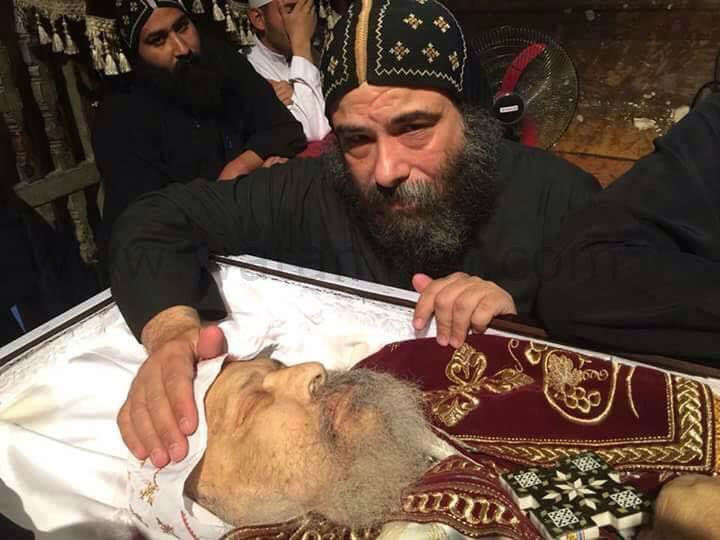Given that Watani International is this year marking 20 years in print—our first issue was printed on 18 February 2001—we have promised our readers to publish every month a review of two years of our issues. We already reviewed the issues of 2001 – 2006 and today we keep good on our promise by covering 2007 and 2008.
Islamism is here
On the political front, the Muslim Brothers (MB), who had gained 88 seats—20 per cent of the seats in Egypt’s Parliament—in the 2005 election through running as independent candidates, were getting more and more powerful, luring the normally pious Egyptians with the promise of ruling according to the teachings of Allah. Islamism was on a rapid rise; the slogan “Islam is the answer” was gaining serious ground. Watani International brimmed with stories on Islamism pervading political and intellectual life in Egypt. Was it a coincidence that hate crimes against Copts rose drastically?
In February 2007, Watani International printed coverage by Nasser Sobhy, “A Muslim Brother party”, on the MB plan to form a political party, even though religion-based political parties were banned by law. But the MB got around that by saying their party would not be a religious one, but a “civic party with Islamic reference”. The coverage exposed the wily political thought and intentions of the MB who, incidentally, could never form their party under President Hosni Mubarak’s secular rule and had to wait till after the Arab Spring in 2011 to form their Freedom and Justice Party. The religious party was pronounced illegal and dismantled by court order, however, in August 2014, once the massive Egyptian Revolution of 30 June 2013 overthrew the post-Arab Spring MB regime and made Egypt the secular State it is today.
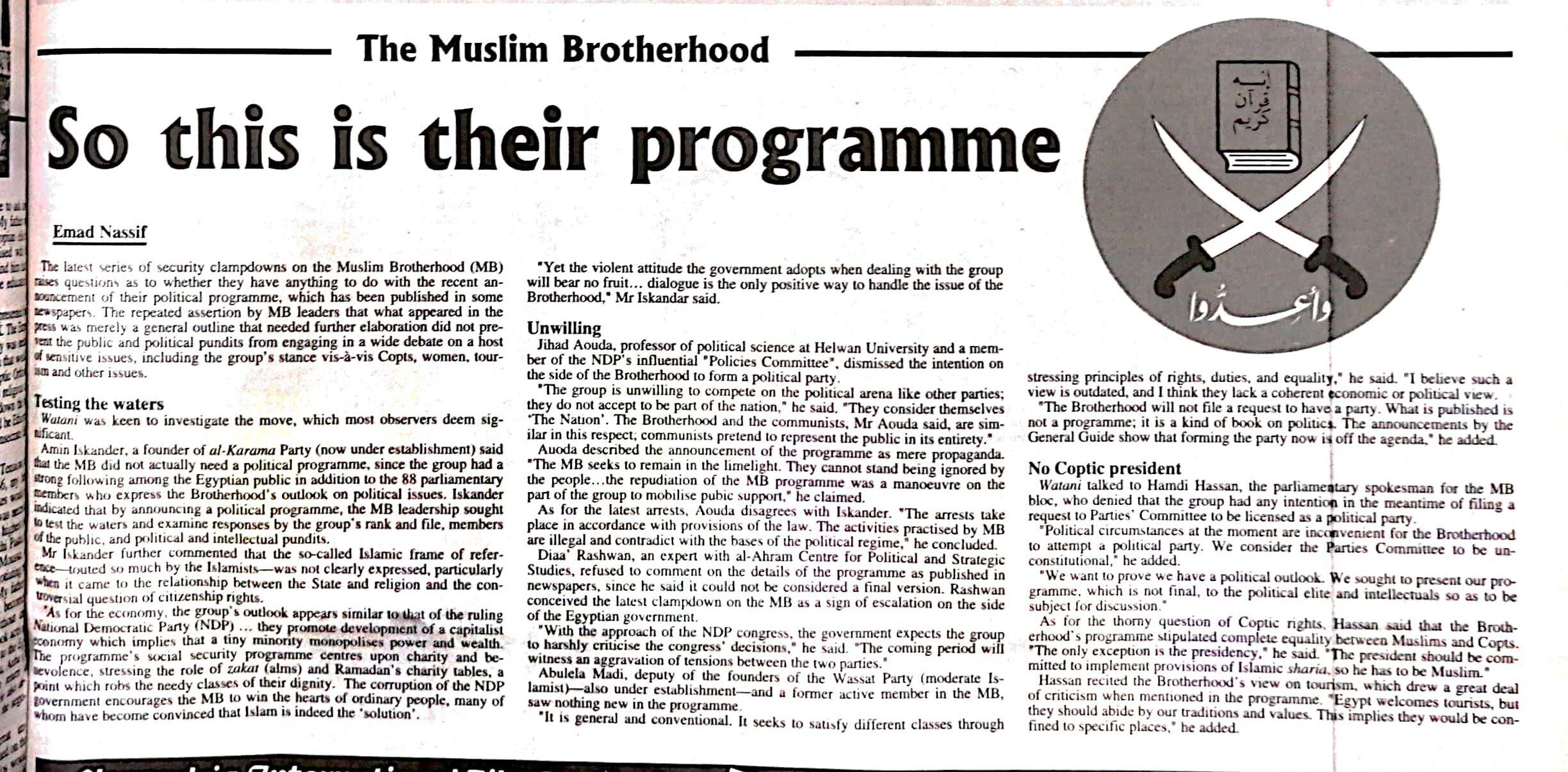
In September 2007, the MB backed on their earlier plan to form a party, saying they would not form their party just yet, but would publicise their political programme. On 18 September 2007, Emad Nassif wrote in Watani International “So this is their programme”, sounding the views of political analysts on it. There was consensus that the MB ‘programme’ was no programme at all, but a mere outline of their perspective.
Sinai: Palestinian Islamic emirate?
In the meantime, Islamism was also gaining ground on Egypt’s borders. In Gaza, Islamist Hamas toppled the secular, ruling Fateh movement and seized power. Maged Samir reviewed the situation on 22 July 2007 under the title “East of Egypt”. Many political analysts, he wrote, were convinced that the power seizure came in response to a fatwa by MB leading figure Selim al-Awwa that those who forsook Islam should be executed; Hamas killed a large number of Fateh members, seeing it as a huge victory for Islam. Following which the second man in al-Qaeda, Ayman al-Zawahiri, made an appearance on al-Jazira TV and called upon Sinai Bedouins to join Hamas to form an Islamic emirate in Egypt’s Sinai. Again, this partly materialised following the Arab Spring, when the Islamic State (IS or ISIS) emerged in Sinai. It was, and its remnants still are, battled by the Egyptian army.
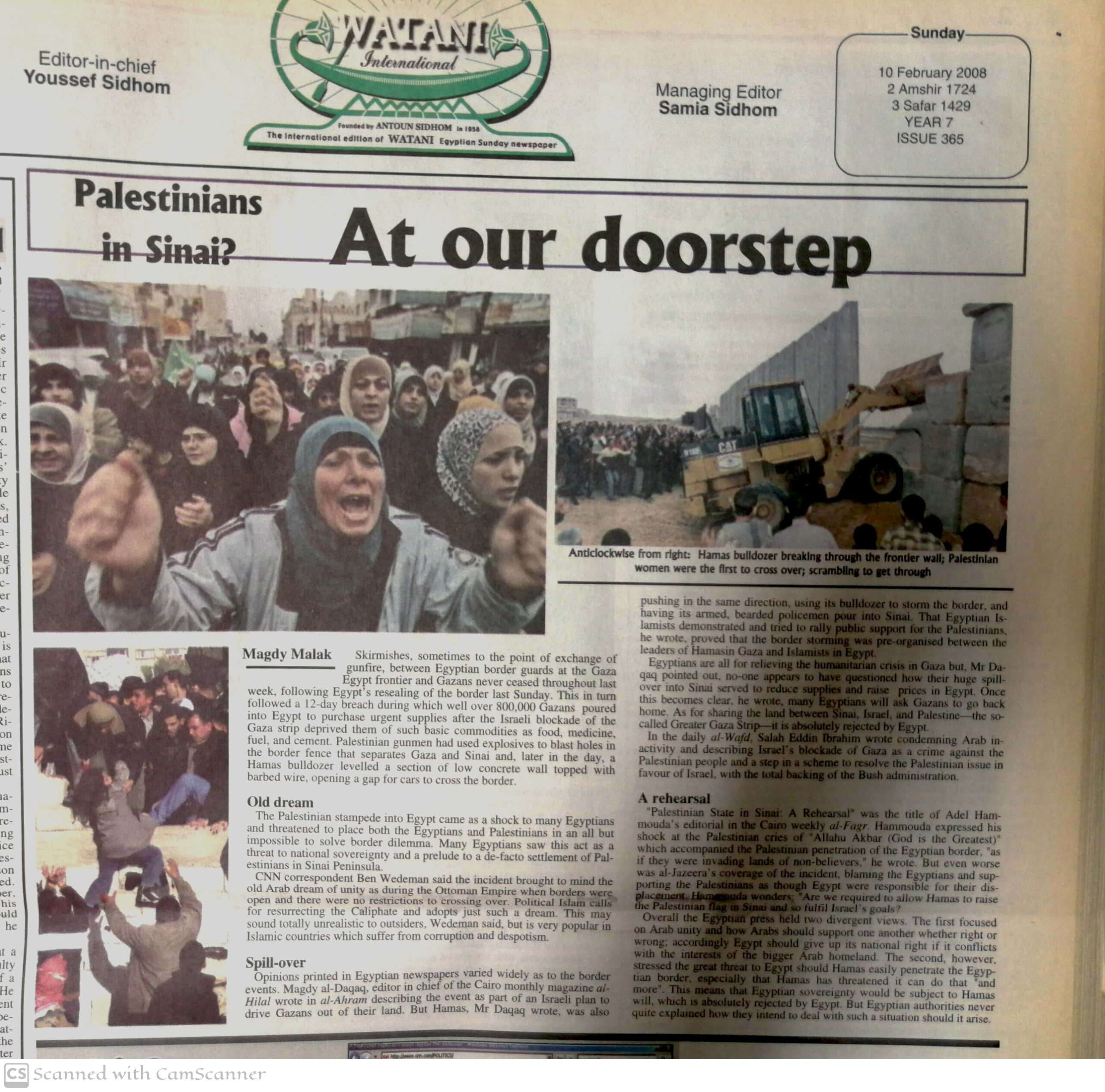
Some six months after Hamas’s power seize, hordes of Palestinian Gazans were pushing their way into Egypt to obtain relief from an Israeli blockade. To stem the tide, Egypt closed its border, opening it only at specific times. Many Egyptians wrote against what they saw as a prelude for a Palestinian Islamic State in Sinai. In Watani International, Magdy Malak analysed the situation in a 10 February 2008 article “Palestinians in Sinai: At our doorstep”.
Christian reconverts
Religious extremism surfaced; conversion and the religion box in identity papers gained notoriety. Especially problematic were cases of Muslim converts from Christianity who would later have a change of heart and wish to revert to their original Christian religion; they were denied the right to have their religious identity corrected on their papers. It was also an excruciating problem for their children who would by law become Muslim even if they did not wish to. And it was invariably worse for Baha’is who were required to cite one of the three ‘heavenly religions’ in the religion box. Watani International tackled the problem in Hany Danial’s 18 September 2007 “Religion box: The unforgivable mistake”; Maged Samir’s 24 June 2007 “Trivialising the religion box”; Robeir al-Faris’s 9 March 2008 “Christian reconverts denied IDs”; and Nasser Sobhy’s 13 January 2008 “Bahai’s: A case of civic death”.
A striking case was that of the Alexandria teenage twins Andrew and Mario Medhat Ramsis who officially became Muslim in 2007 on account of their father’s conversion to Islam. The boys, however, refused to be Muslim. When they had to sit for a mandatory school exam in Islamic religion; they each handed in an answer sheet that included only the words: “I am Christian”.
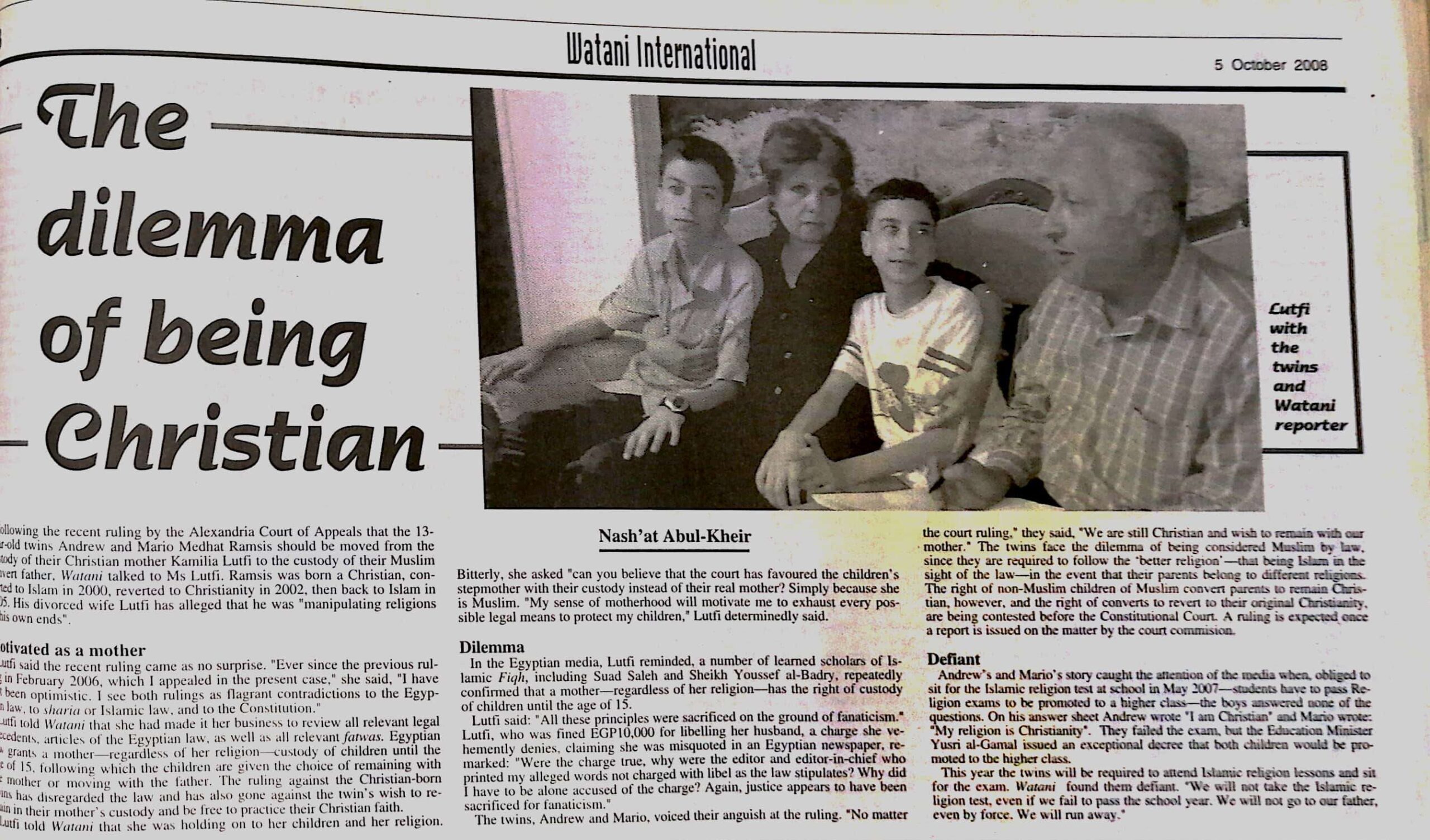
It took great courage for them to do so, because rejecting their [official] Islamic religion made them guilty of ridda, an Islamic offence punishable by death. Their Christian mother fought a bitter legal battle for her to retain their custody and for them to retain their Christian identity. She eventually won, and the twins remained Christian. Watani International started reporting on their case in August 2007, covered by Nash’at Abul-Kheir and Lydia Farid.
Copts: political bloc to reckon with
How did Copts take all this? Noteworthy is that young Copts attempted to take a more active role in politics and in the public sphere, with many joining political parties or engaging in activities that would make their voice heard. On 11 November 2007 Watani International printed “Where political parties are concerned where exactly do Copts stand?” by Nader Shukry, and “The Coptic candidate” by Sameh Fawzy; also on 2 December 2007 “Coptic youth announce: We are part of this country” by Lydia Farid.
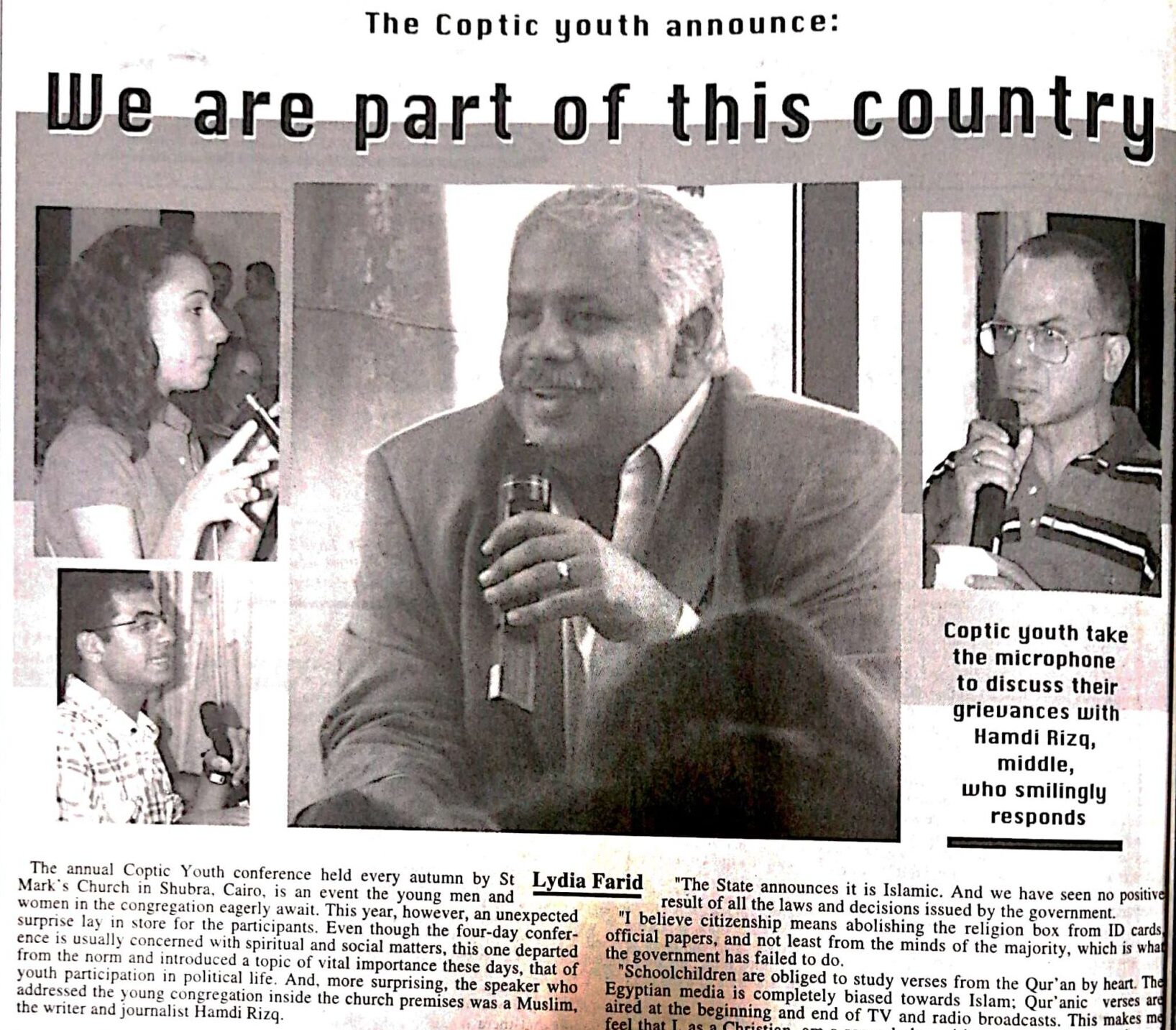
This had the effect of revealing Copts as a political bloc to reckon with; parties responded positively as in Ishaq Ibrahim’s 20 January 2008 “Luring Copts into politics”. Ironically, even the MB attempted to persuade Copts to join their movement, arguing that Copts would then be better protected; Magdy Malak tackled that issue in his “Is Islam the answer for Copts?” on 23 March 2008.
Attacks against Copts
Did it come as a surprise that the striking rise in Islamism should go in tandem with an escalation in attacks against Copts? Watani International reported on many of these attacks, commonly termed “sectarian incidents”. The term is erroneous in that it implies that Muslims and Copts both fought on equal footing, when in fact it was the Copts who were invariably the victims of attacks. The years 2007 / 2008 saw such incidents reported at a rate of more than once a month. At the time, we were appalled by what we saw as too-frequent attacks against Copts, only to see that rate alarmingly escalate further during future years.
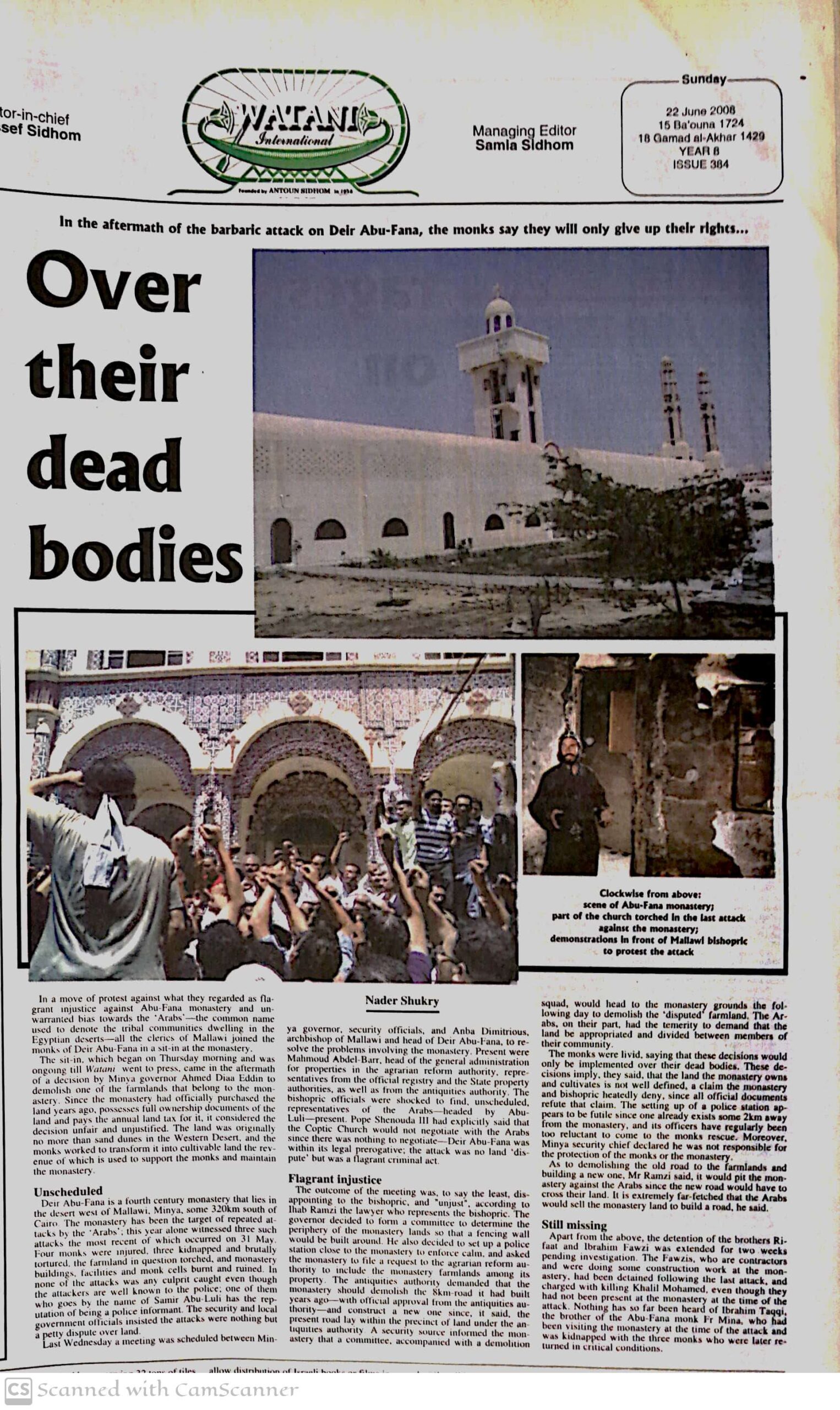
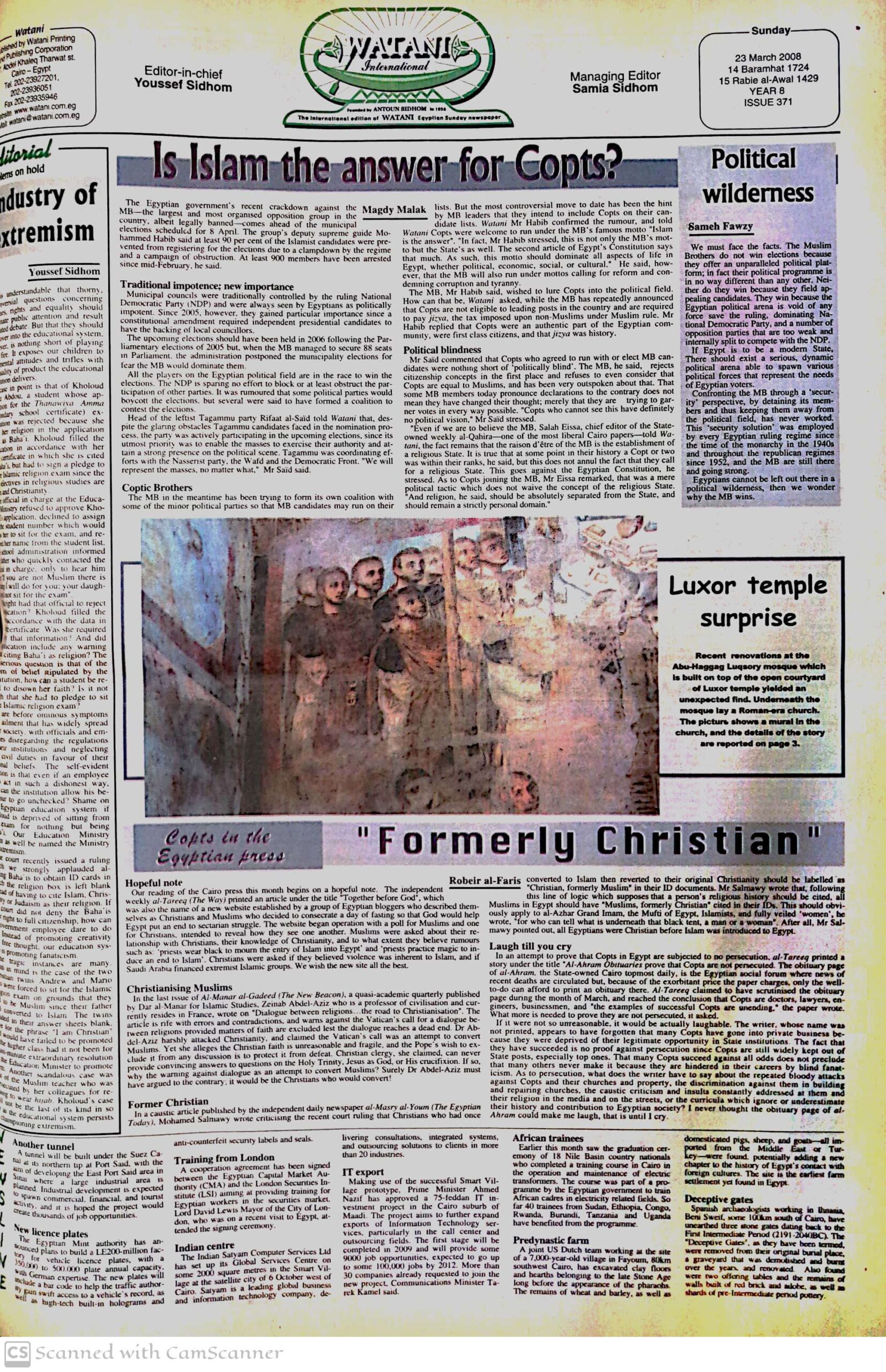
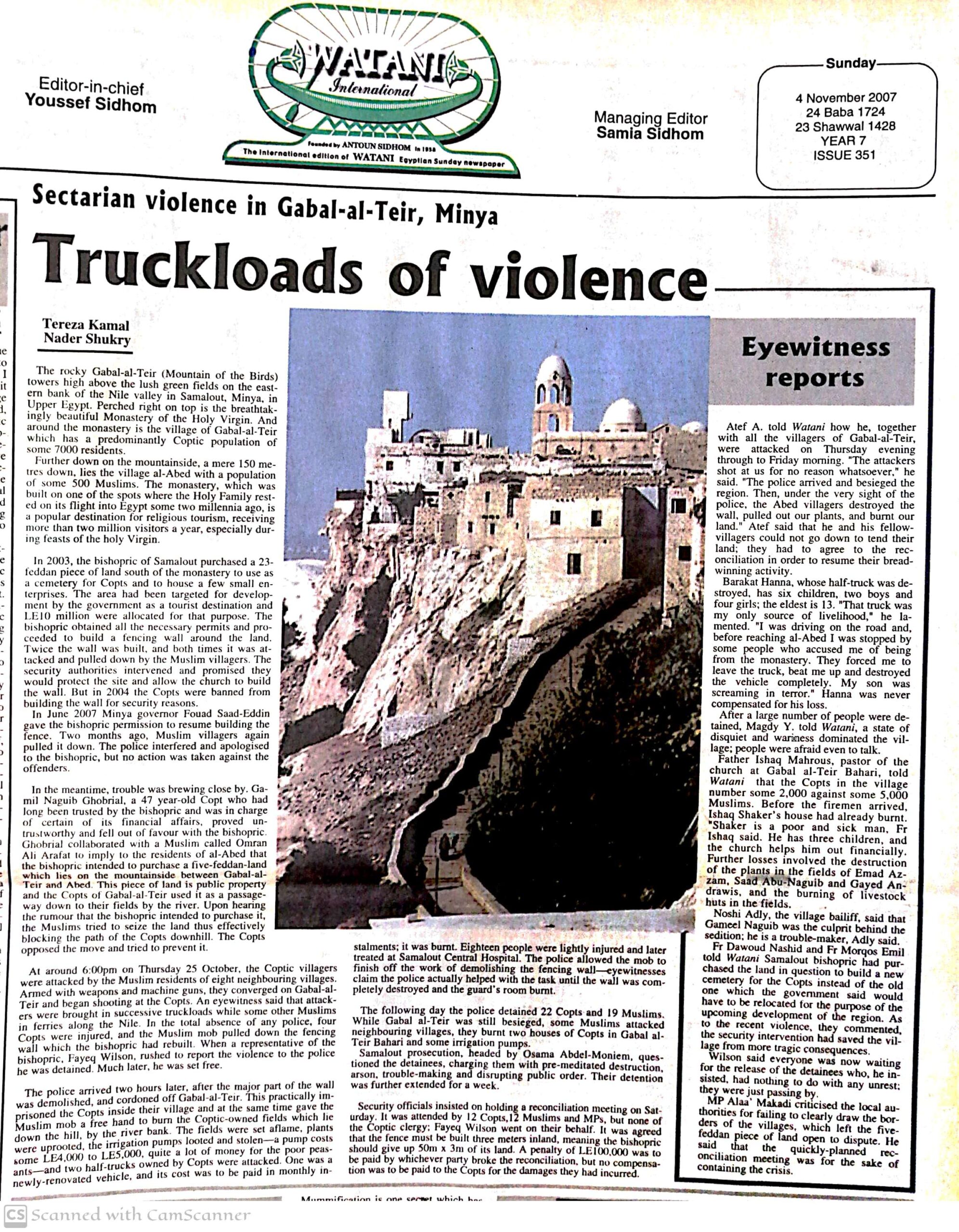
On 14 January 2007, Watani International started a monthly series “Copts in Egyptian press” by Robeir al-Faris, which tracked the reporting on Coptic issues in various Egyptian papers or magazines. Such issues had gained prominence for the simple reason that they figured highly on the public scene, and commanded wide interest and controversy. It was not surprising that Islamic leaning papers, sometimes even State owned papers, took to regularly deriding Christianity and Christians.
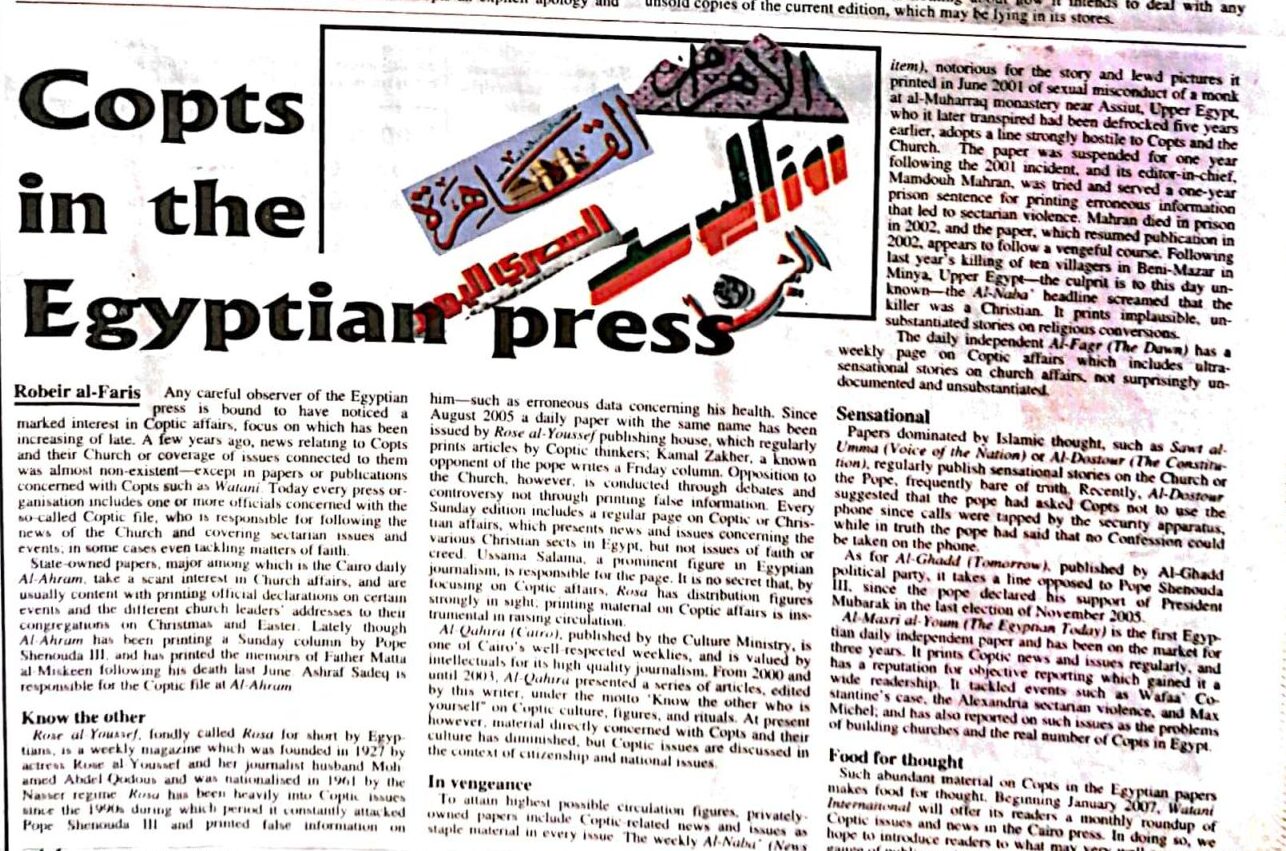
Attacks against Copts were reported in-depth in Watani International. They were especially rampant in rural areas where mob spirit and a culture of collective punishment reign, and came under various pretexts. Among these were disputes over land; praying in unlicensed churches or in houses that functioned as de facto places of worship; rumours of amorous relations between Coptic men and Muslim women, a big no-no in Islam; normal mundane fights that occur between two who happen to be a Copt and a Muslim. Once any such pretext was found, a Muslim mob would attack Copts, their churches, property, and homes. Beatings, stone throwing, and fires would become standard.
Forced into “conciliation”
In February 2007, Copts’ shops in Armant were burned in the wake of a rumour that Coptic men were converting Muslim women; and the annual Cairo Book Fair included a sizeable display of books that propagated hate and terrorist thought. In March, the Copts in the Minya hamlet of Ezbet Hanna Ayoub were evicted into nowhere and their homes demolished in order to build an Islamic institute. Incidentally, the institute was never built, and the Copts resettled on their original land, but have been brutally harassed and their homes damaged more than once. In May and June, the Copts of Ulaiqat and Bemha in Upper Egypt were attacked for attempting to have a church. The Muslim villagers said they would have no church in their mosque-dominated villages; the Copts must find somewhere else to pray. Countless hate crimes were committed against Copts.
The year 2008 brought on a series of notorious attacks against the monastery of Abu-Fana in Minya resulting in huge destruction and monks brutally tortured, bringing to mind the Dark Ages.
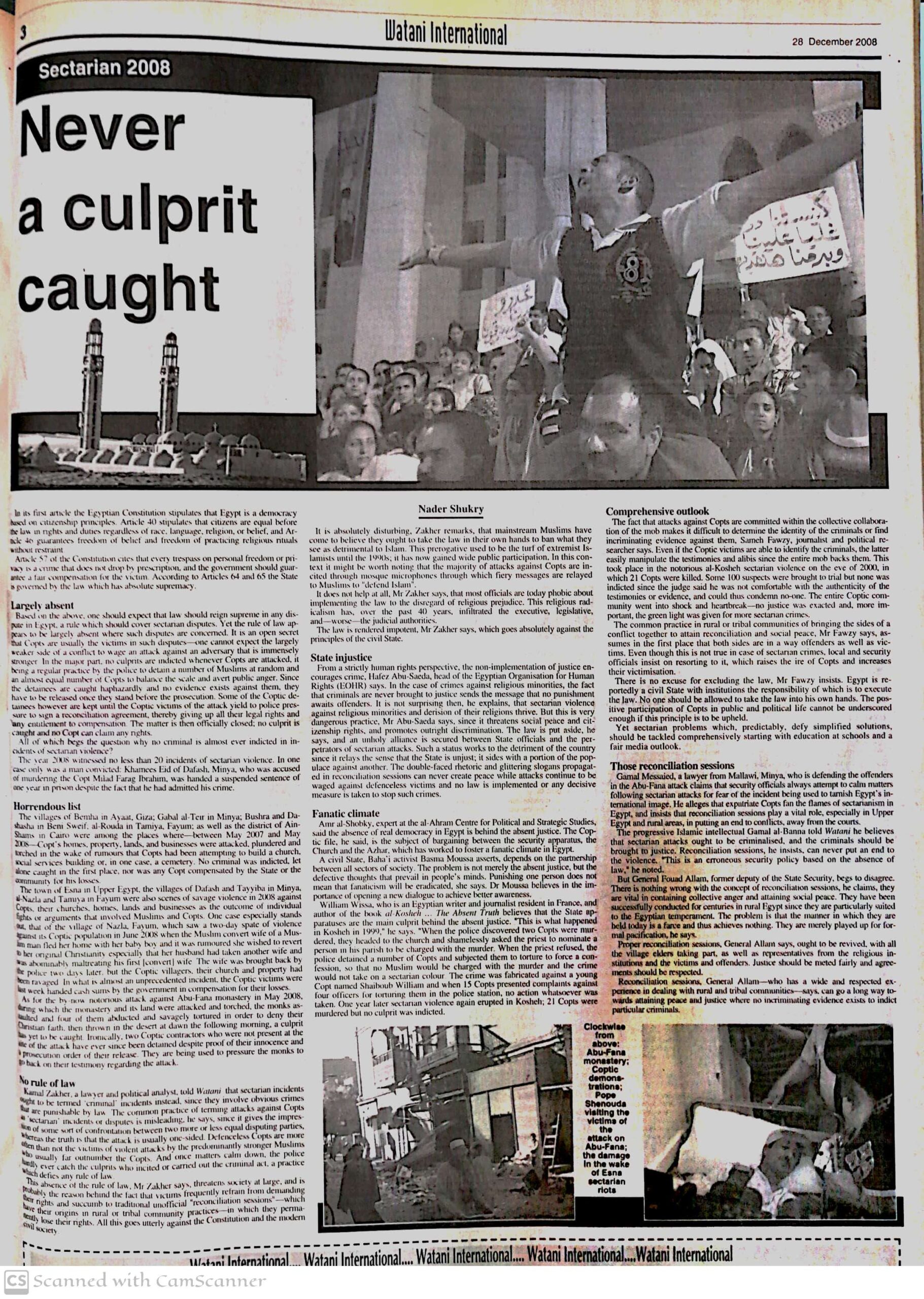
The many sectarian incidents in 2008 prompted Watani International to print a year-end roundup by Nader Shukry titled “Never a culprit caught”. It listed the most significant of the incidents and assessed the outcome. We cannot, for reasons of limited space, detail them here, but a reader who would care to refer to them in old issues of our paper will find it a harrowing, heart wrenching experience. To add insult to injury, the large majority of these incidents ended with the Coptic victims pressured to “reconcile” with their attackers; that is to “agree” to a traditional out-of-court settlement which is always highly unjust to the Copts and forces them to relinquish their dignity and legal rights.
On civic front
On the civic front, strikes by workers in public sector industries including textile, cement, and oils and soap, were new to Egypt. All these were losing industries saddled with huge numbers of workers since Egypt’s socialist years. The workers demanded unpaid benefits and protested ‘forced’ early retirement intended to reduce the bloated work force. It was outstanding, however, that even when the government acquiesced to their demands they did not go back to work but raised the ceiling of their demands. The climate was altogether one of turmoil. The protests spread to numerous other sectors such as the railway workers. Ishaq Ibrahim, Maged Samir, and Magdy Malak wrote on “Striking rights”; “Protests here to stay”; “Higher salaries to survive”; “Pay rises, price rises” on 3 June 2007, 28 October 2007, 9 December 2007, and 11 May 2008.
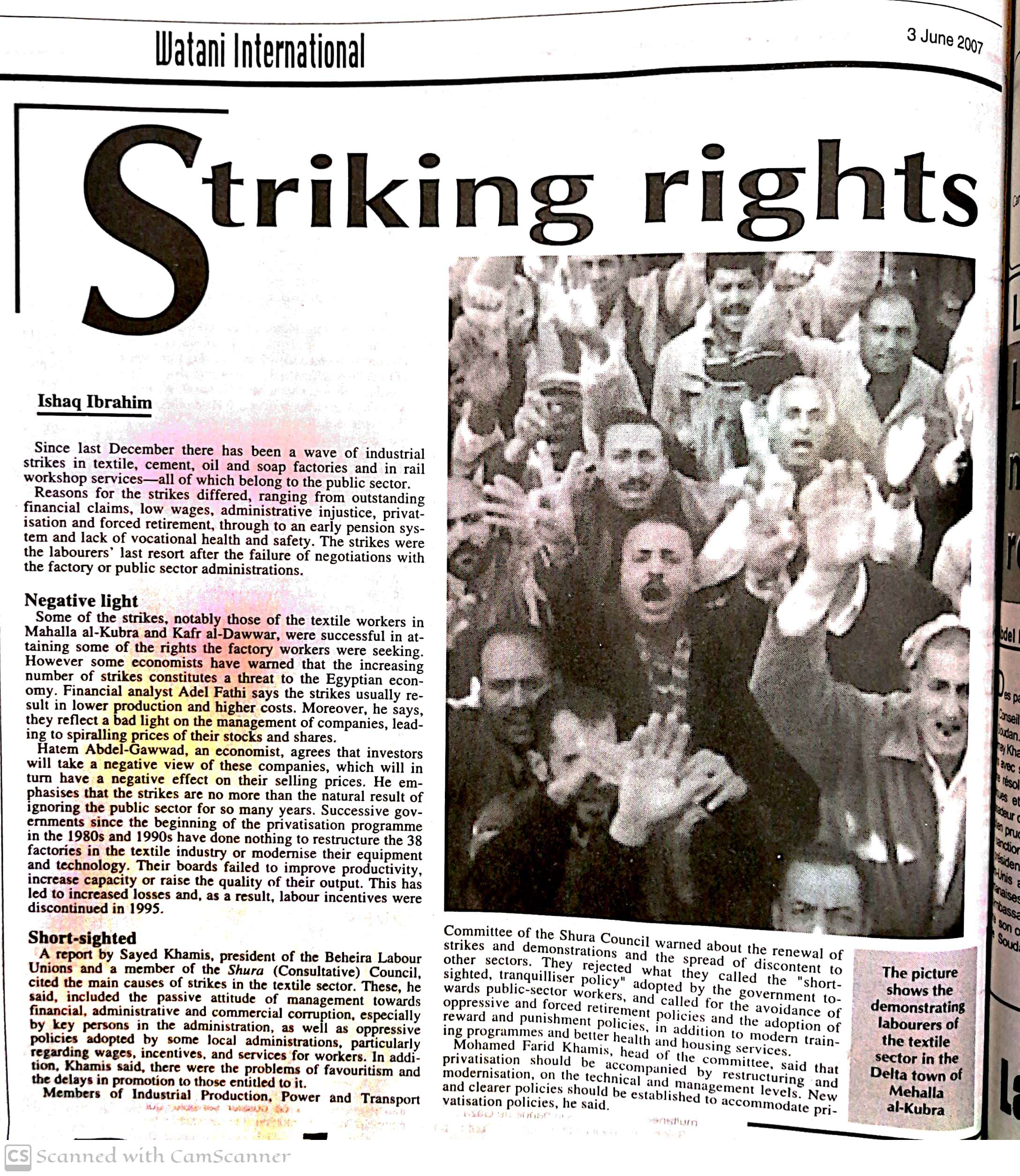
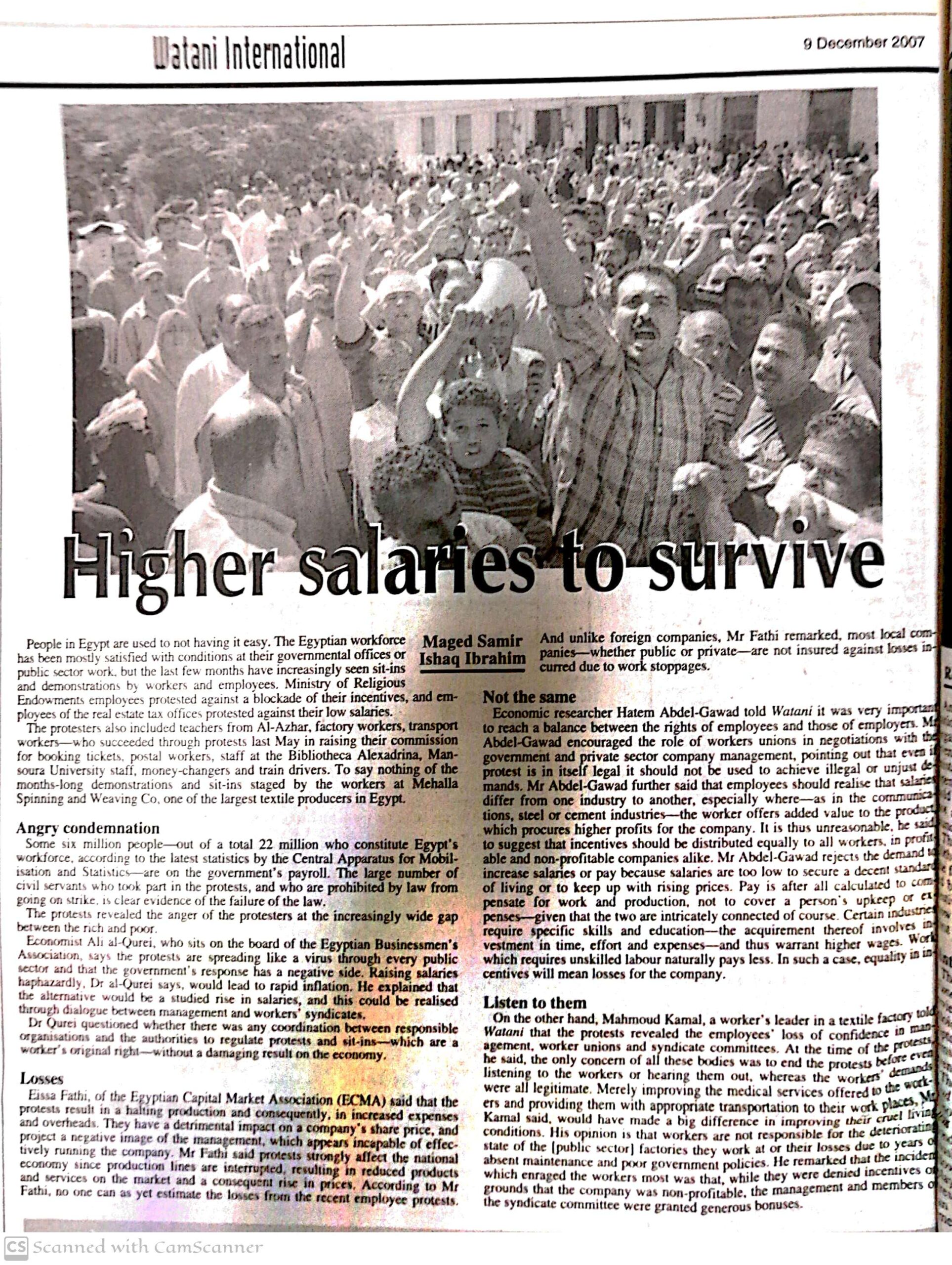
Other than the unrest, Watani International covered diverse topics of public interest. Among these were the “Plight of the Nubians” by Mervat Ayoub in March 2007; Egypt’s plans to generate nuclear energy, also “Health insurance for Egyptians: A matter of life and death” covered by Nasser Sobhy on 29 April 2007 and 29 July 2007 respectively; the outsize bread subsidy by Sobhy and Nassif on 6 January 2008; “Overpopulation: the looming tidal wave” by Georgette Sadeq on 22 June 2008; and Egypt wining its sixth Africa Cup of Nations by Maged Samir on 17 February 2008.
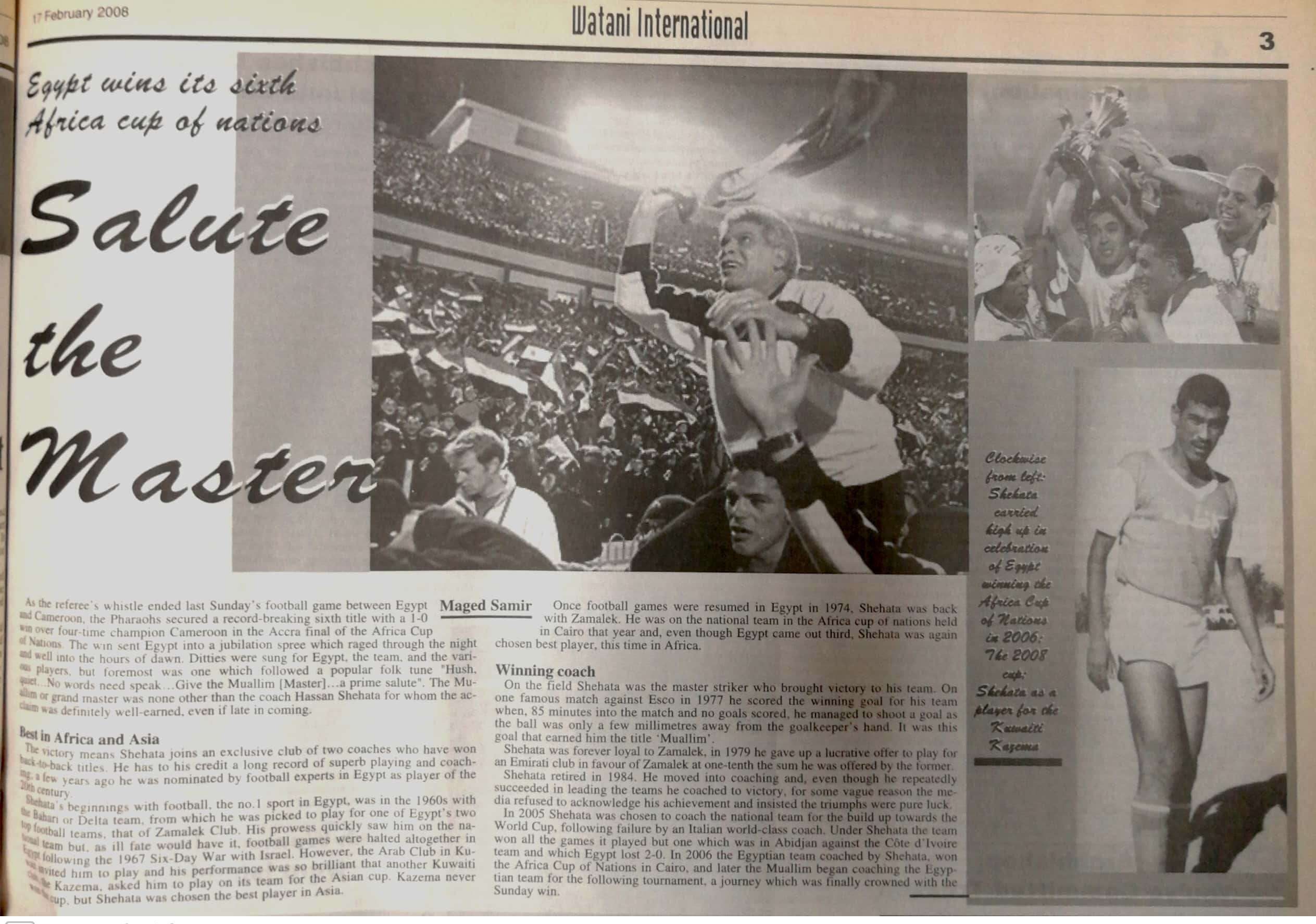
Women and children issues, especially those concerned with violence and abuse, were tackled by Nadia Barsoum, Ikhlass Atallah, Tharwat Fathy, Nader Shukry, Salwa Stephen, and Madeleine Nader on 13 May 2007, 7 October 2007, and 2 March 2008.
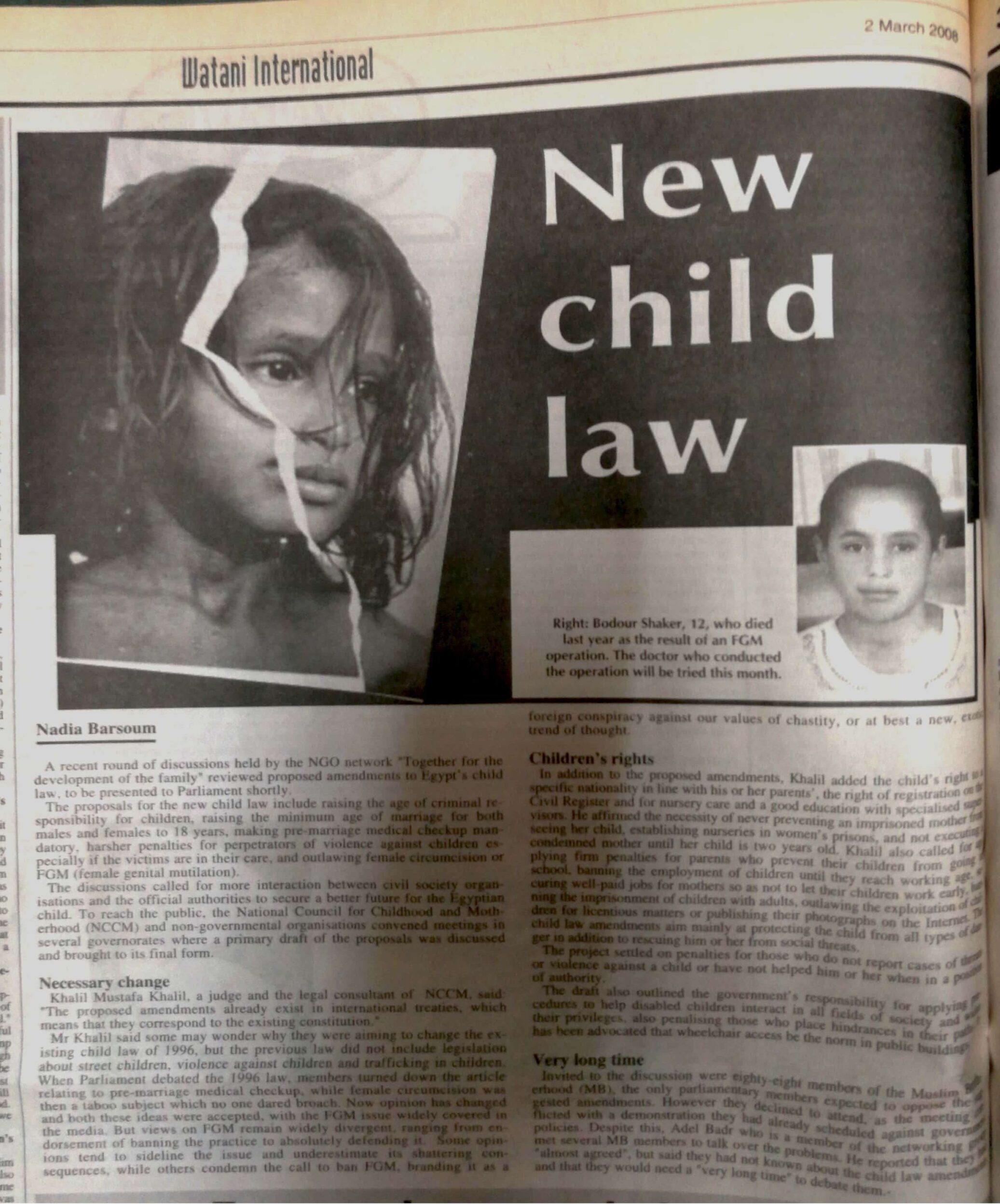
Fire … and inspiration
Two fires rocked Egypt in 2008. On 24 August, Maged Samir wrote on the fire which raged on for 11 hours in the 19th-century palatial building that houses Egypt’s upper house of parliament, then termed the Shura Council, burning it down. The official reason given was an electric short circuit. But what was especially painful was that many in the public gloated over the loss of what was then seen as a stronghold of the ‘oppressive’ ruling regime. In his coverage, Samir reminded of other devastating fires in the modern history of Cairo.
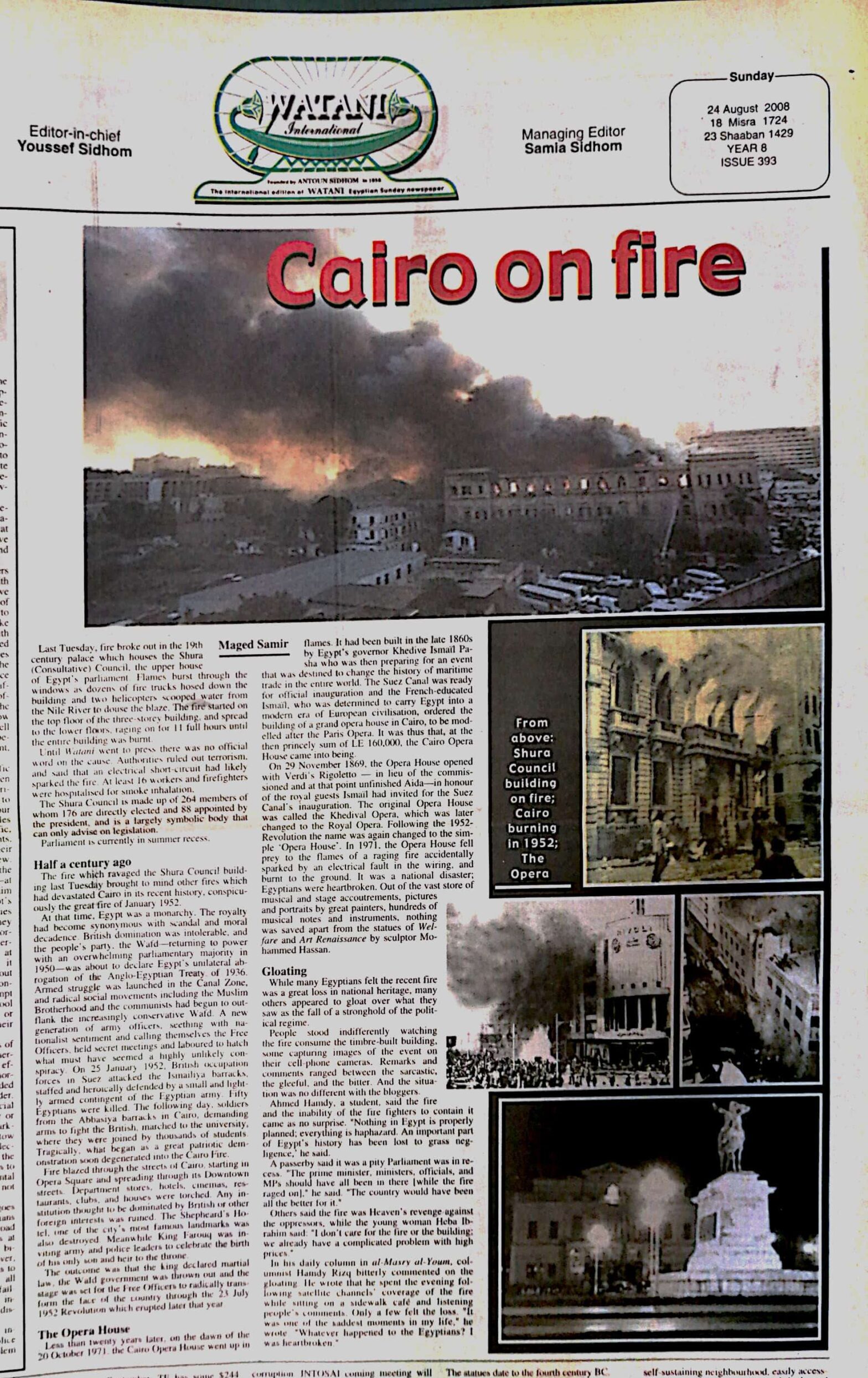
The other fire erupted four weeks later in Egypt’s National Theatre in Cairo. On 5 October 2008 Robeir al-Faris and Mervat Ayad reported on the incident and on the magnificent early 19th-century building. The two buildings have since been beautifully restored and functioning.

In October 2008, Egypt received a visit by Nick Vijucic who was born without limbs and who was then 26. Nick was hosted by the Alexandria Village of Hope, a NGO founded by Nada Thabet for the development of persons with mental disabilities. The visit was a huge success; Nick’s vivid, witty, inspirational message wrapped in good natured humour was greeted by Egyptians with resounding reciprocal warmth. The event and the Village of Hope were covered in Watani International by Samira al-Mazahy, Nevine Kameel, and Samia Sidhom on 19 October 2008.
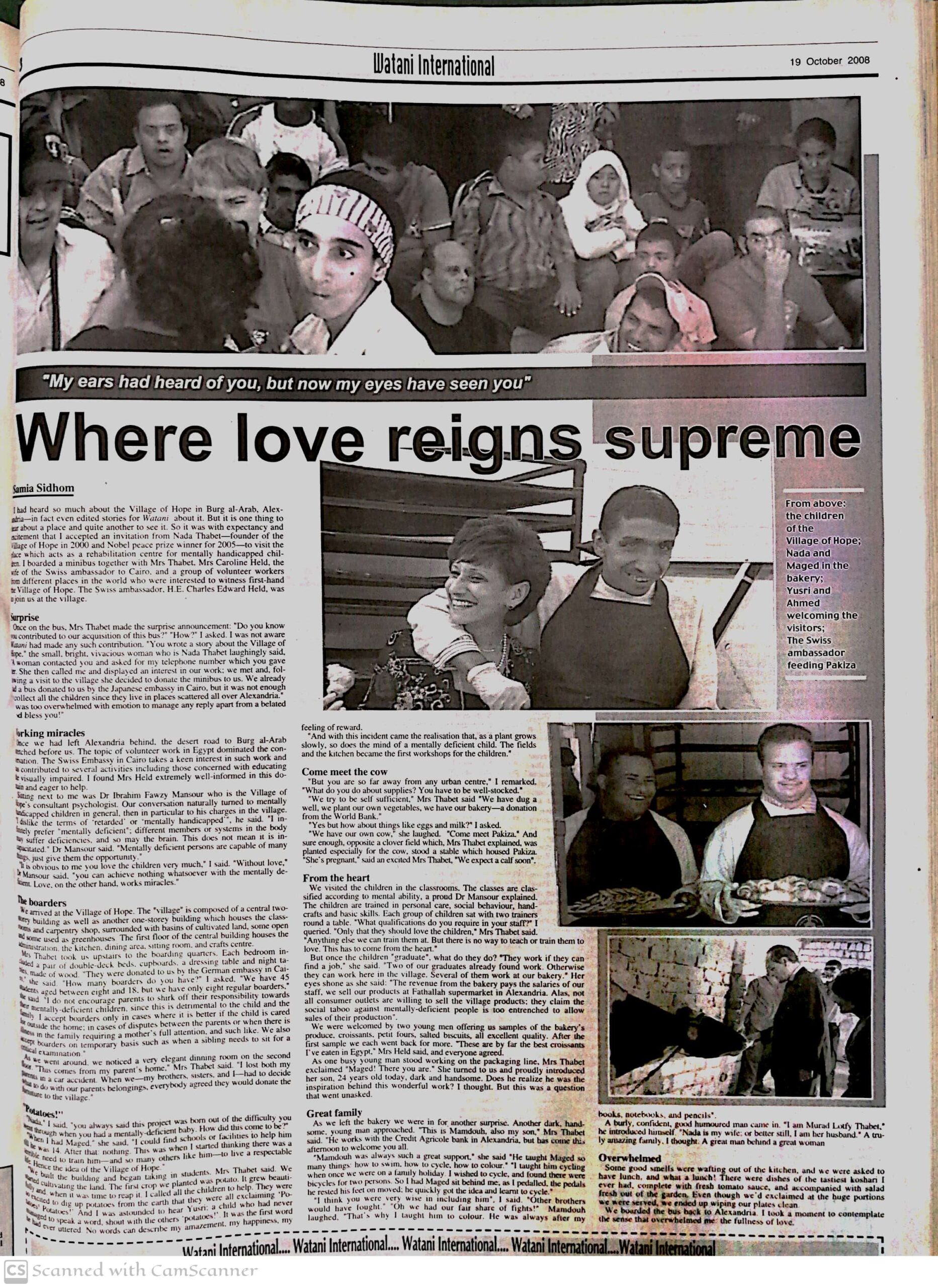
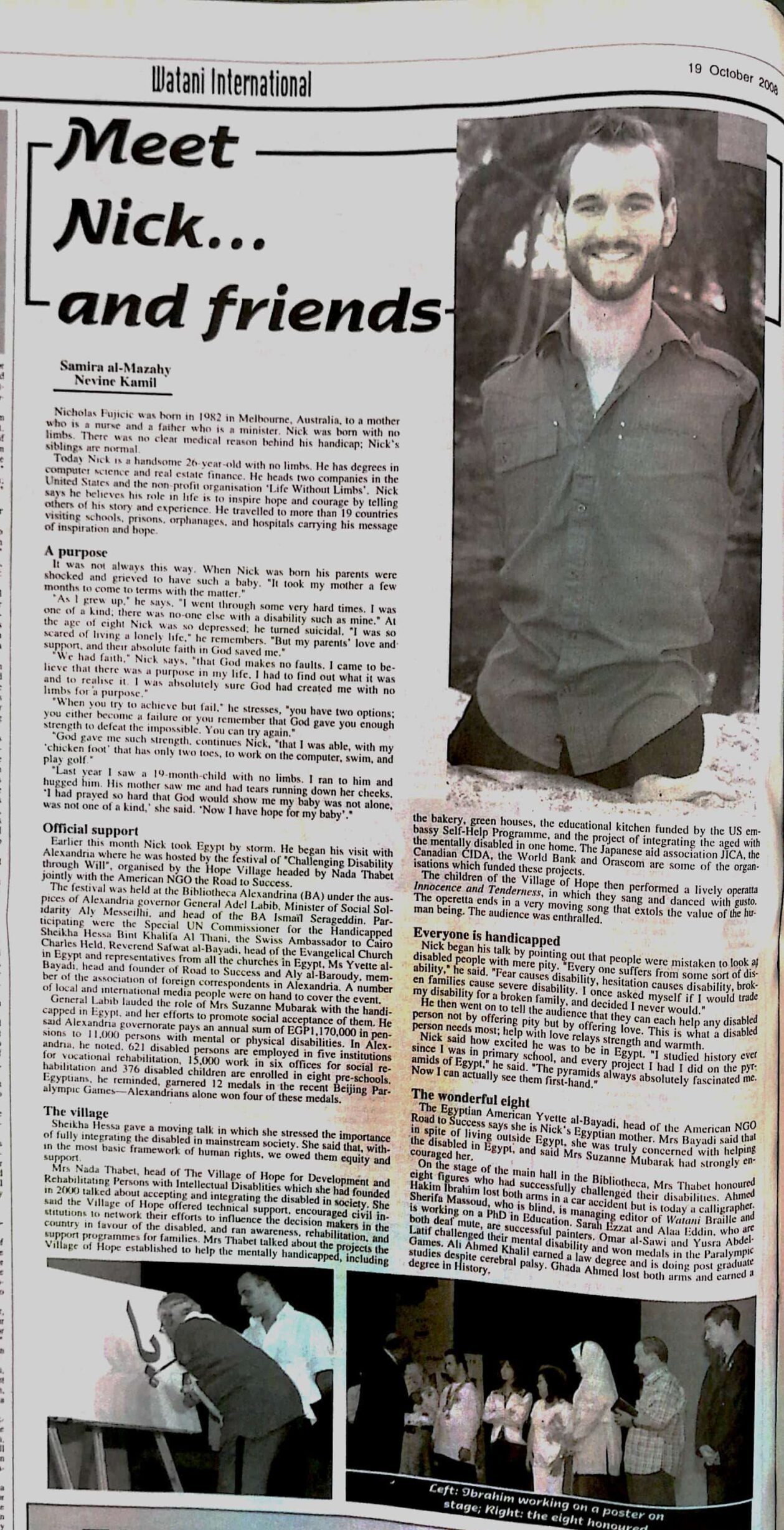
Culturally…
As is customary with Watani International, cultural topics took prominent coverage. One especially beautiful story was written by Mary Fikry on 6 April 2008, titled “That sheer grandeur” and covered al-Gilf al-Kebir, literally ‘the Great Cliff’, a mountain plateau on Egypt’s southwestern tip that houses caves with some stunning prehistoric rock art.
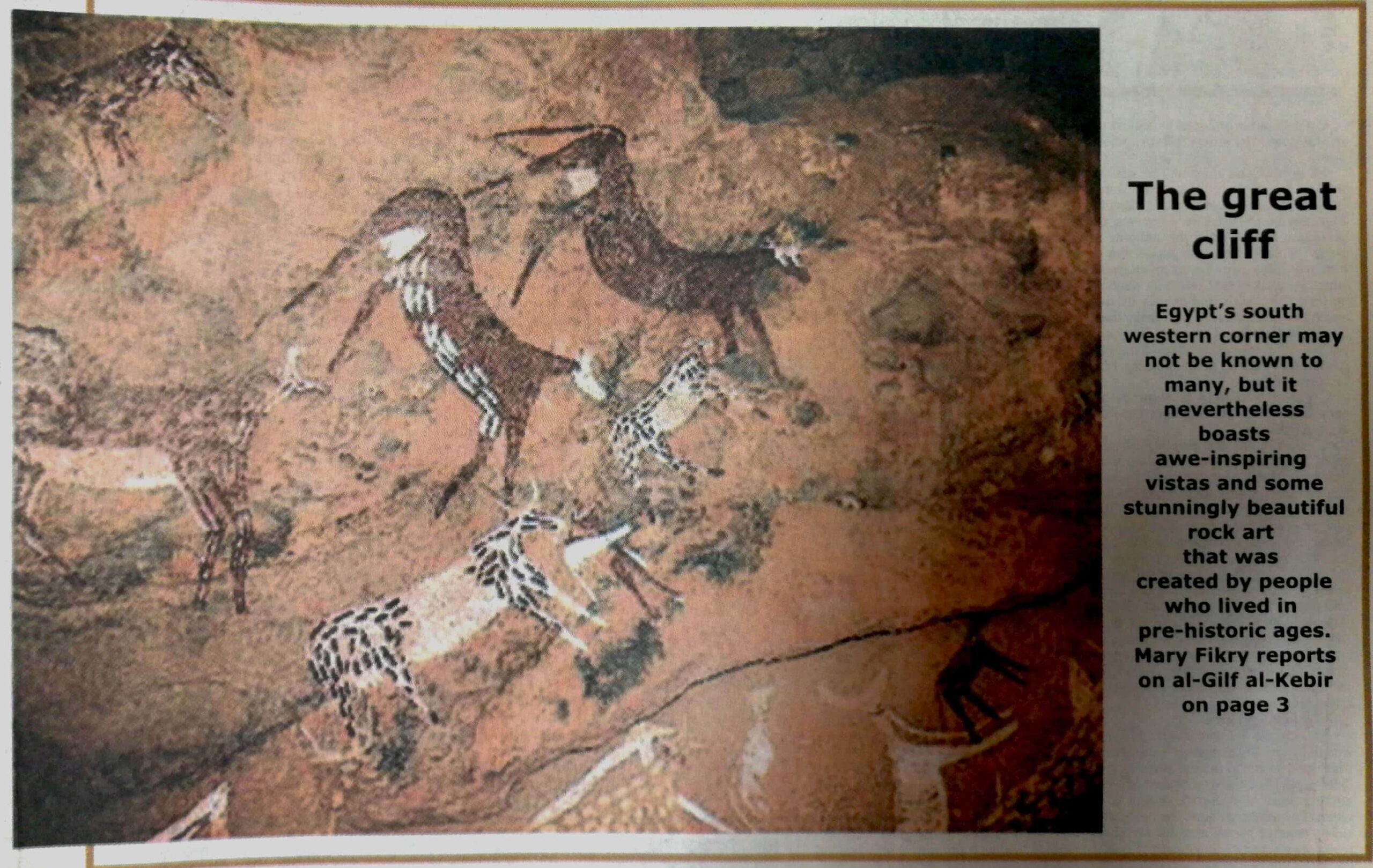
Throughout 2007 and 2008, Maged Samir, Mervat Ayad, Sanaa’Farouk and Teresa Kamal wrote on the opening of restored buildings of prominence, including parts of Karnak temple in Luxor; the 4th-century church of Holy Virgin at Haret Zeweila in Cairo, the Hanging Church in Old Cairo, and the monastery of St Anthony the Great near the Red Sea; also the Islamic Museum in Cairo, the 10th-century gates of Cairo, and the historic al-Muizz Street in Islamic Cairo.
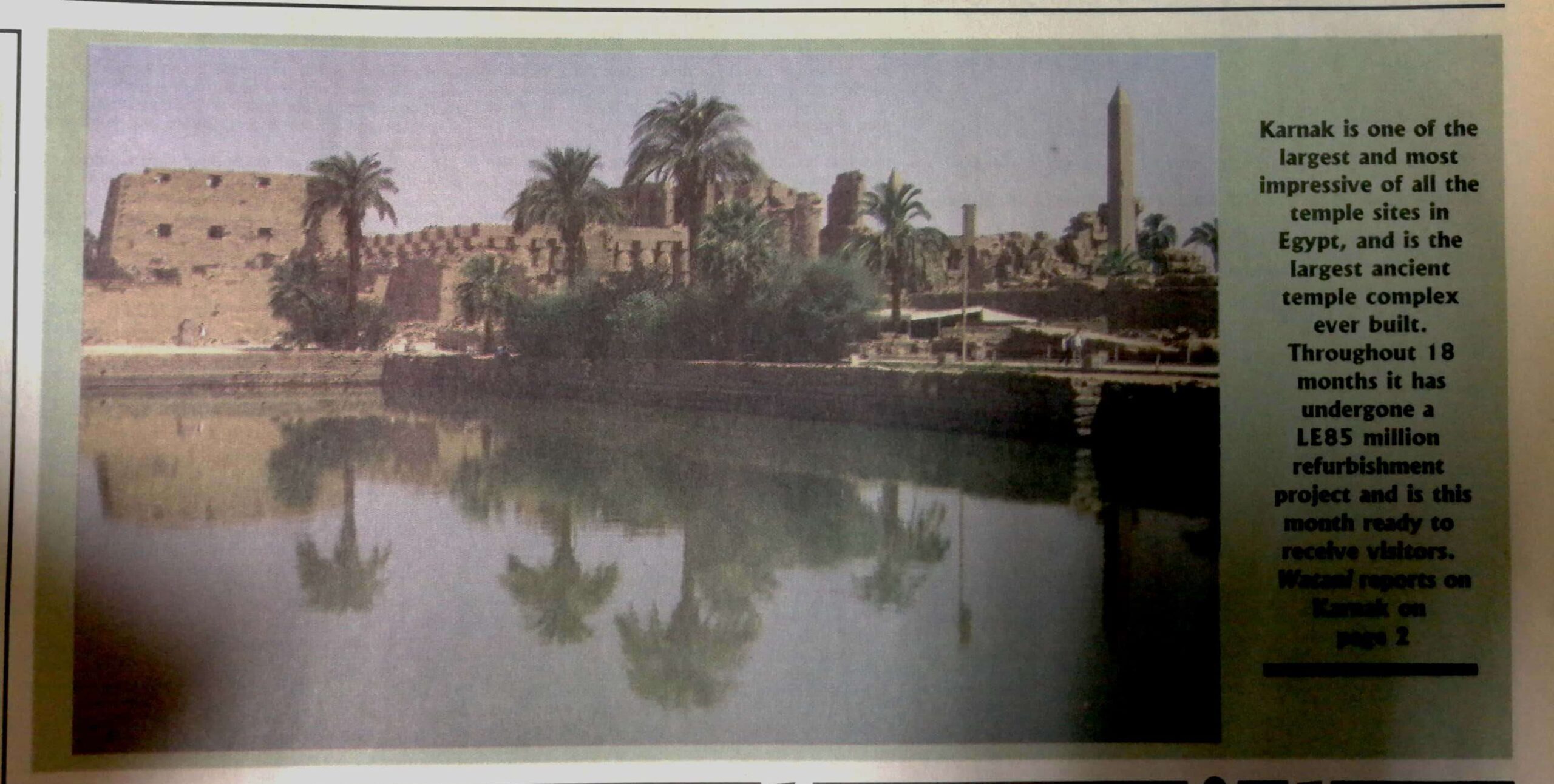
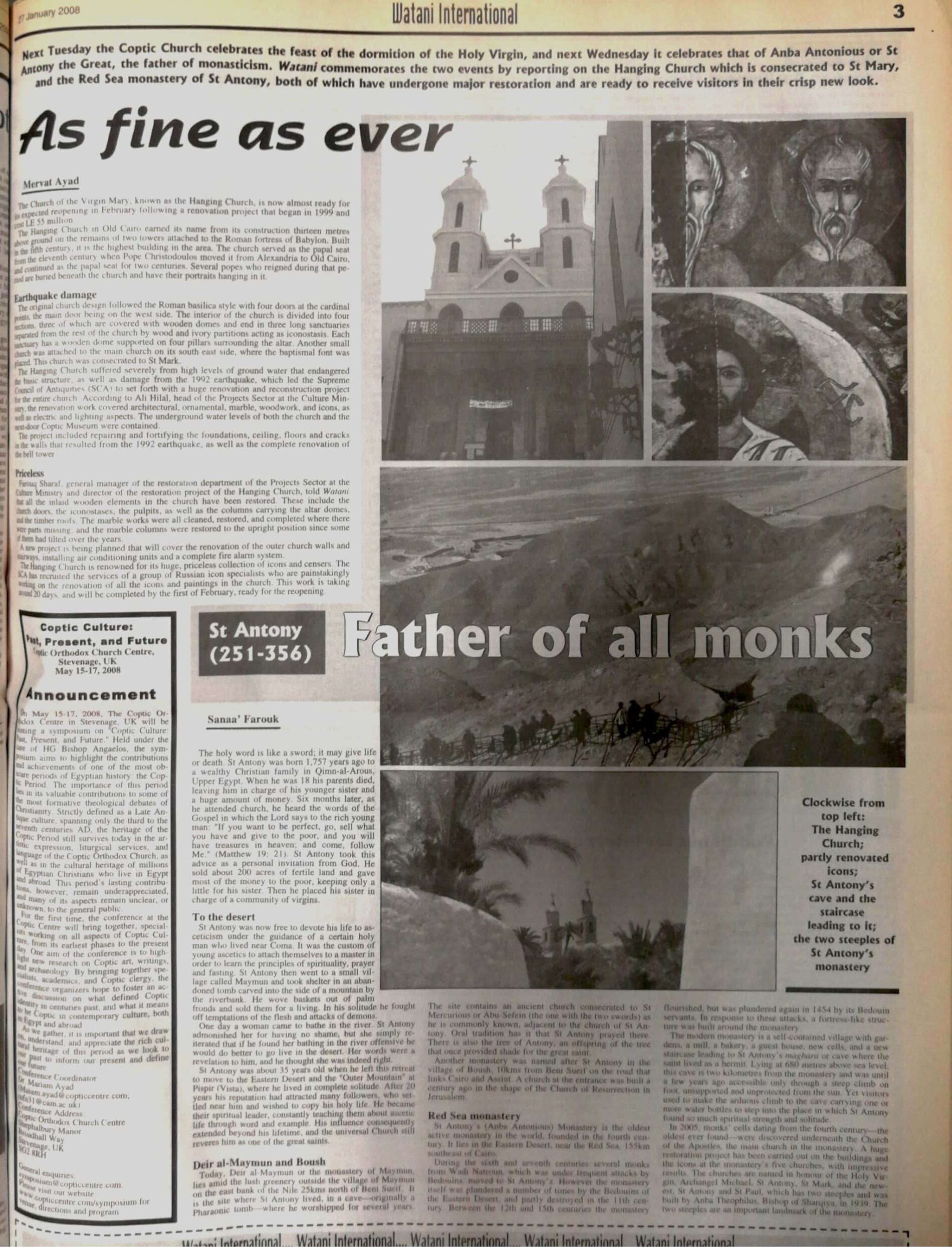
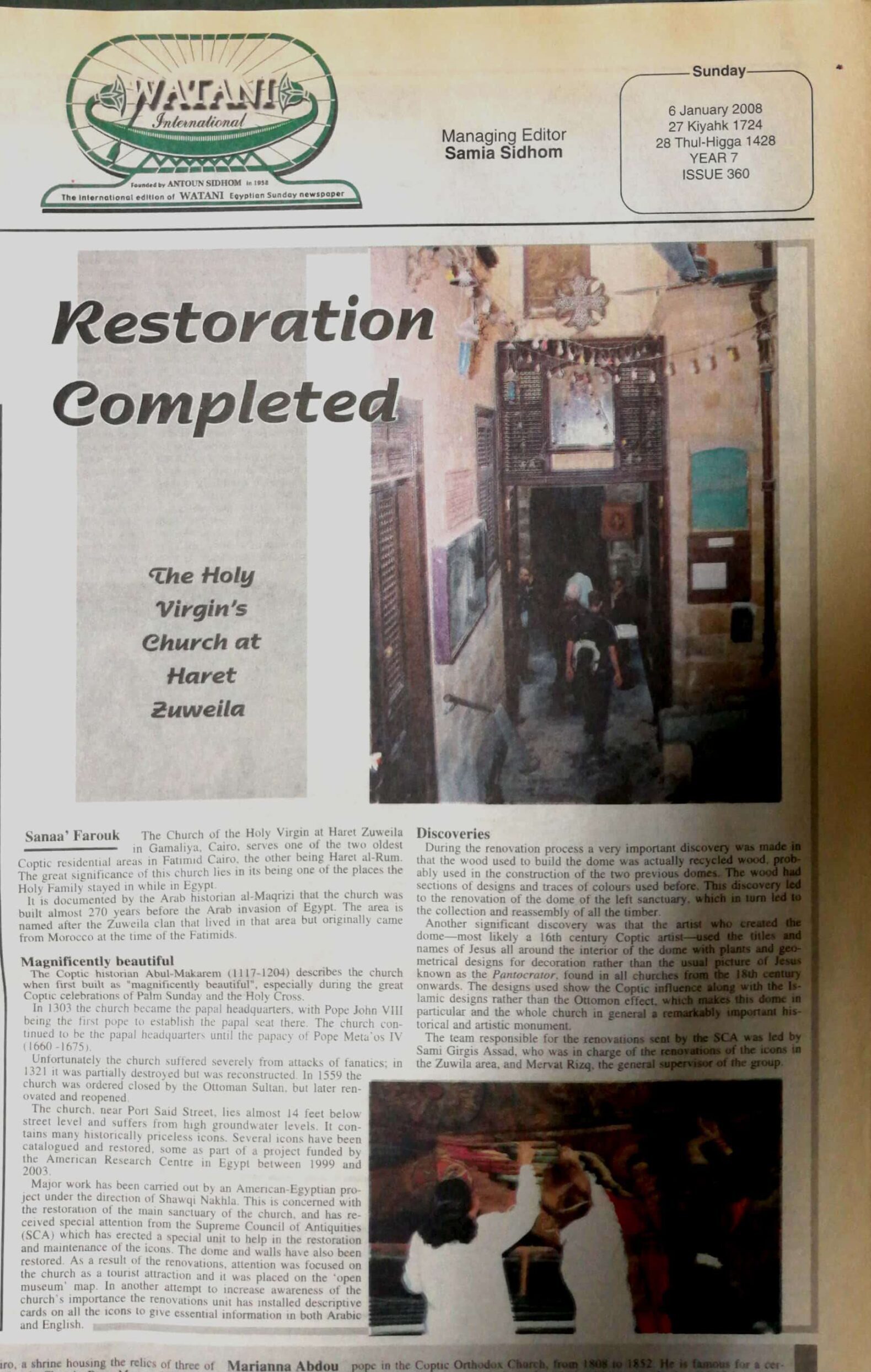
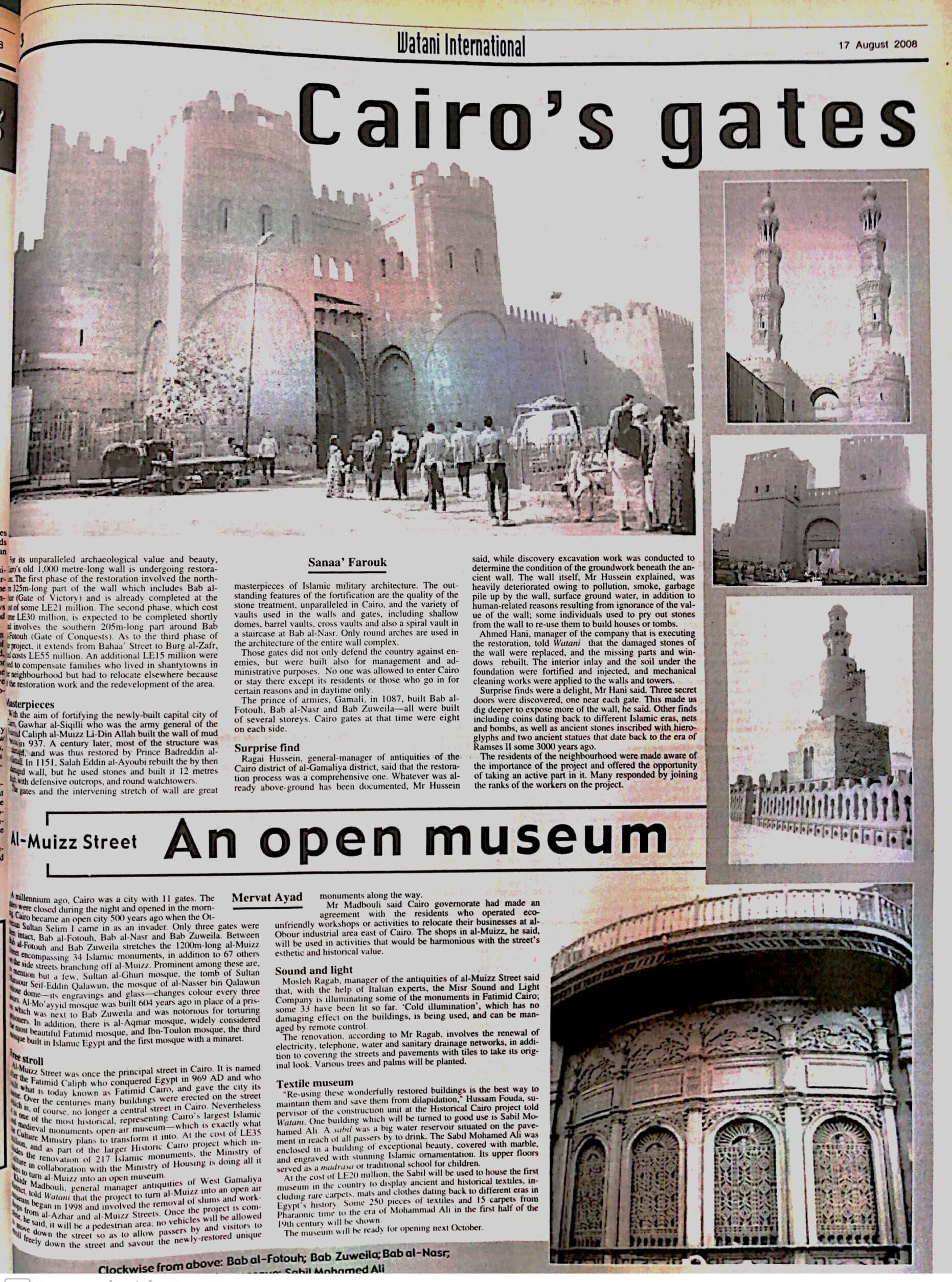
On 25 May 2008, Donia Wagdy covered a street festival in Heliopolis, Cairo, under the theme “One World”.
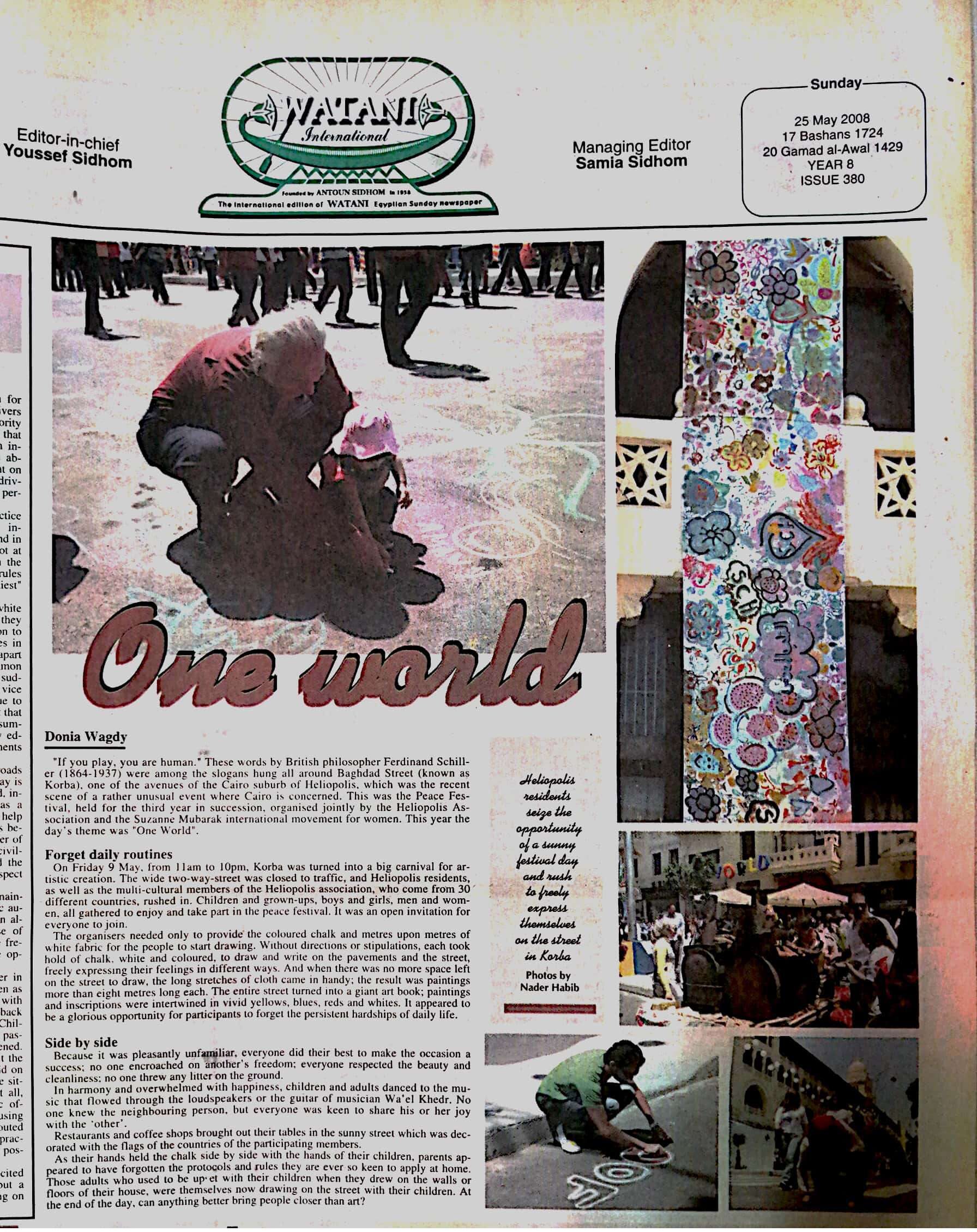
Among the film reviews printed by Watani International was one “Hassan and Morqos” reviewed by Robeir al-Faris on 13 July 2008, a film directed by Rami Imam, which tackled relations between Muslims and Copts in a realistic way, and featured as lead actors Omar Sharif and Adel Imam.
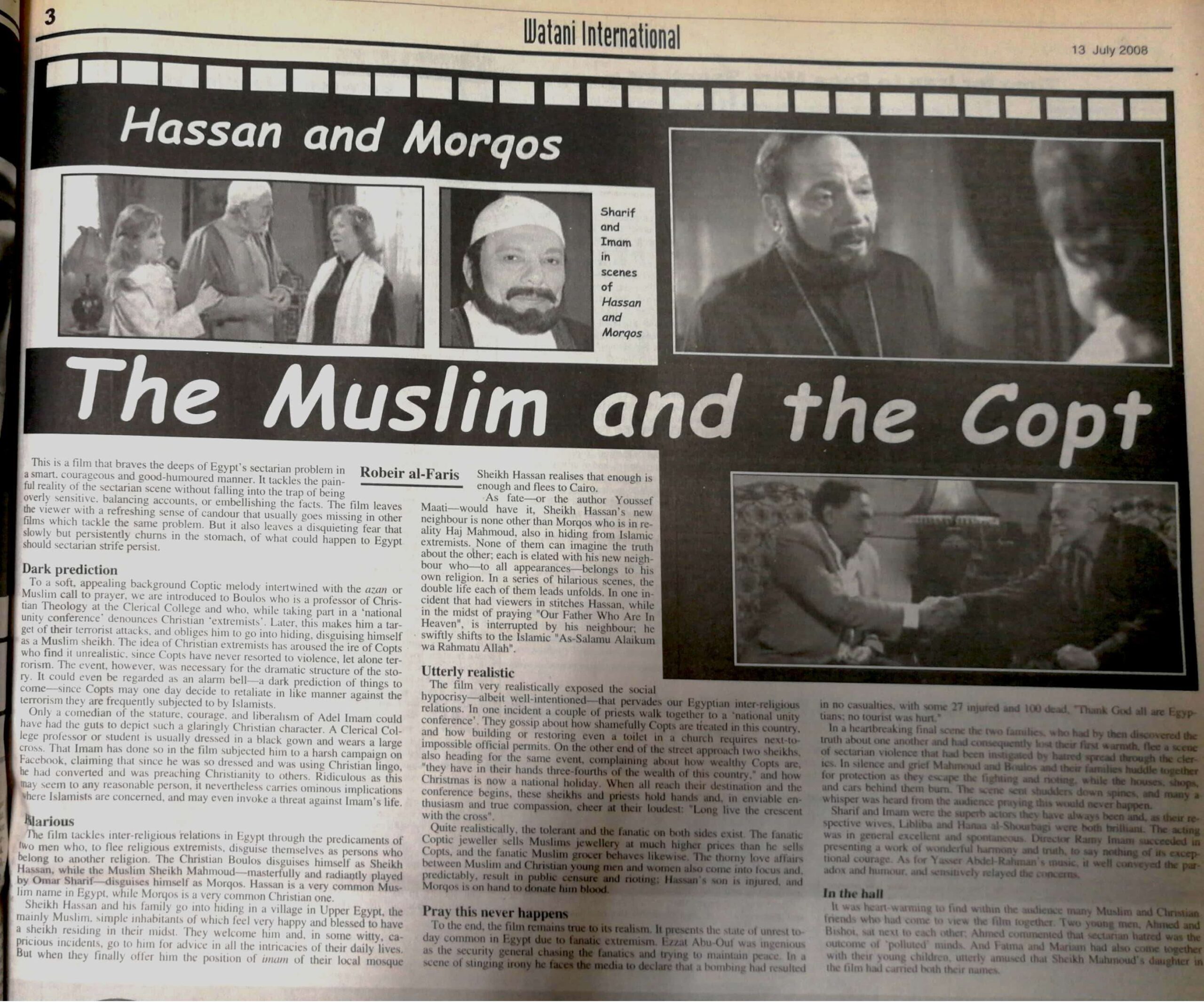
”We can’t go against our conscience”
As far as the Coptic Church is concerned, two incidents stand out in 2008. In March, a court ruling was issued requiring the Church to allow remarriage of a Christian who had obtained a civil, but not a Church, divorce. As reported by Victor Salama and Magdy Malak on 9 March 2008, Pope Shenouda III said the Church could not go against its conscience by going against the teachings of the Bible. But the incident brought to light the need for a family law for Christians, a draft of which had been shelved for some 30 years. Ishaq Ibrahim wrote on that in detail in his “Are 30 years not enough?” on 6 April 2008. This year, 2021, a unified family law for Christians in Egypt, drafted by the main Christian sects in the country, is expected to go through parliament.
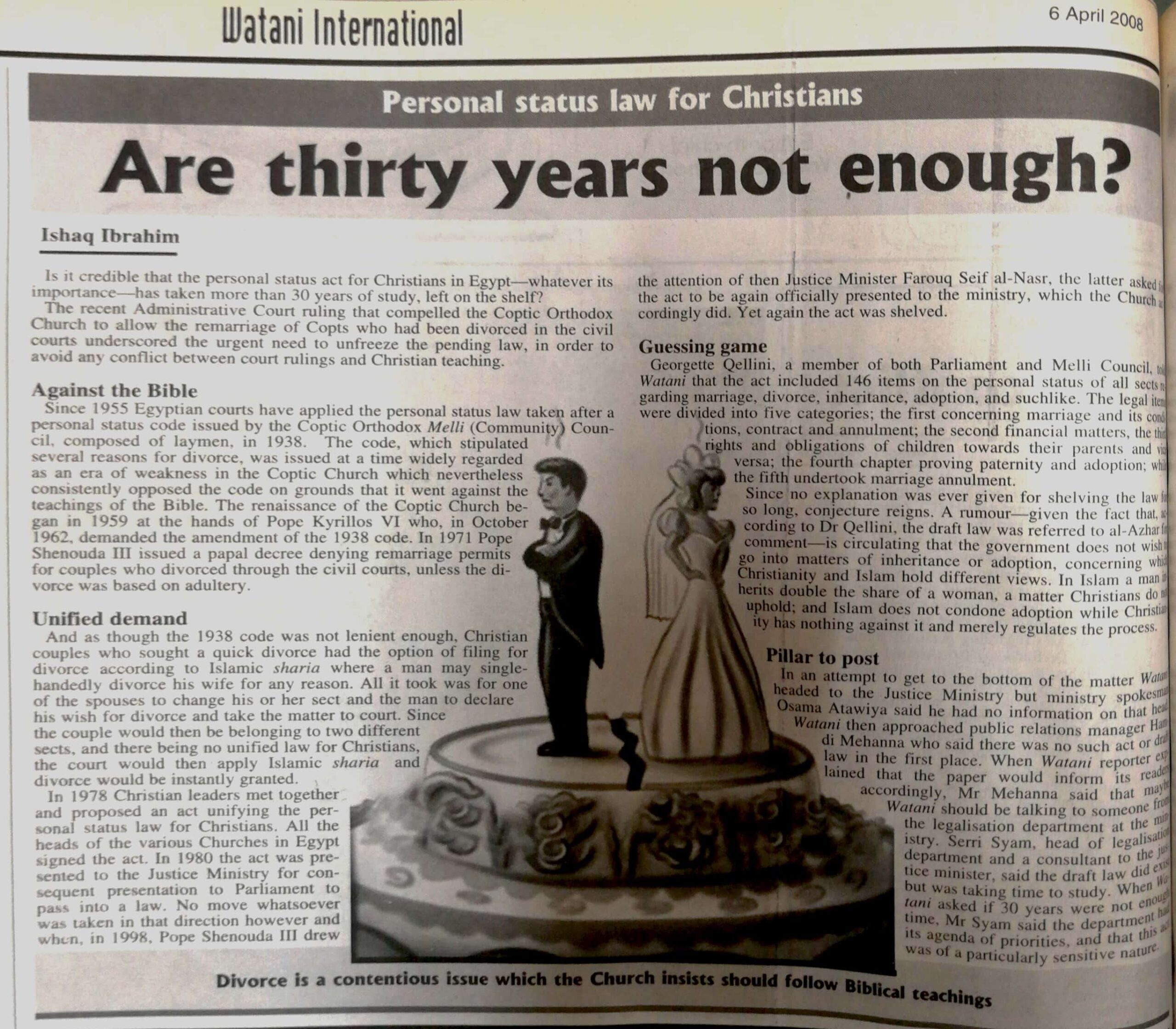
On 27 April 2008, Victor Salama covered the preparation of the Holy Myron Oil by Pope Shenouda and members of the Coptic Orthodox Holy Synod.
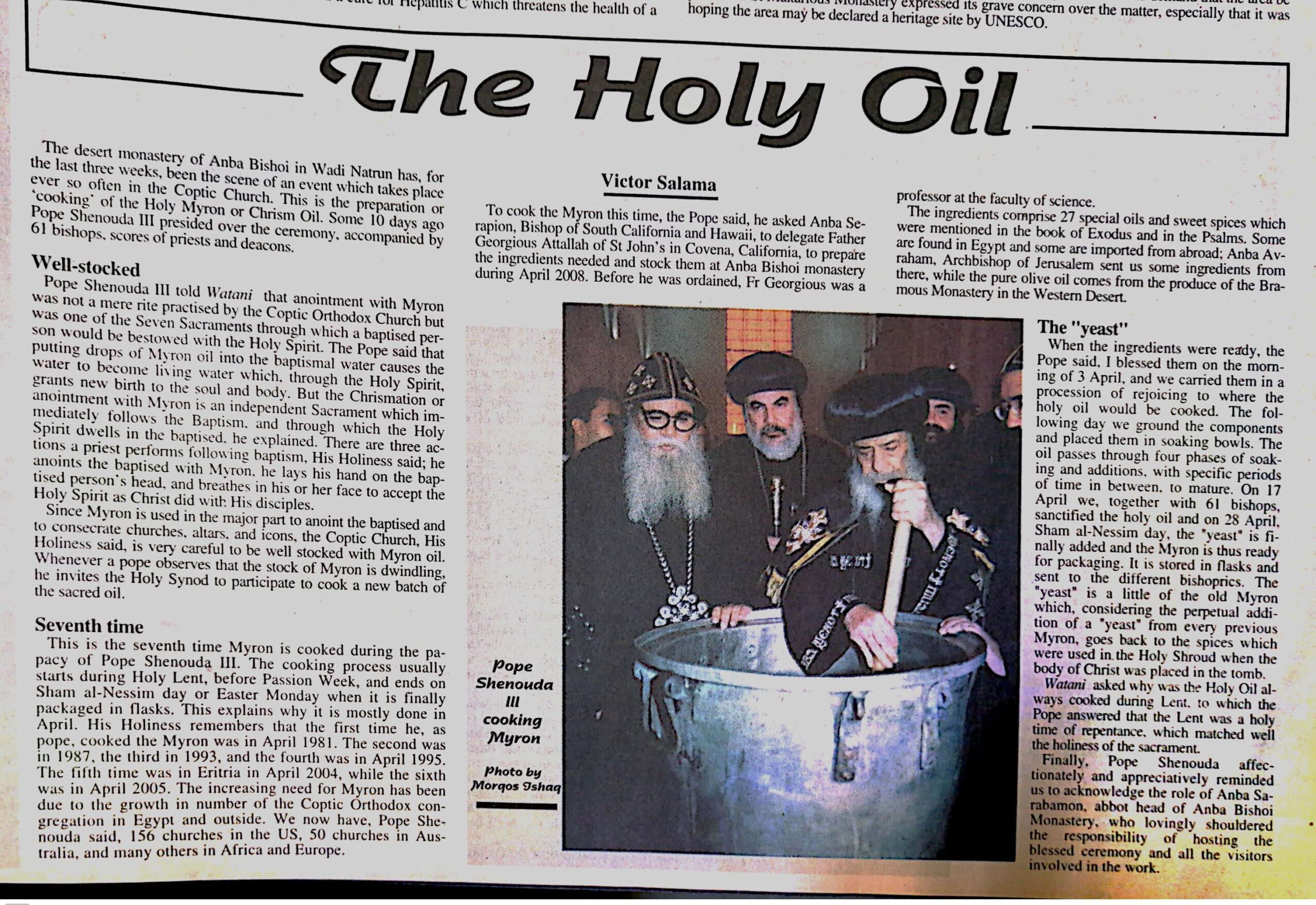
In 2007, Egypt lost Isaac Fanous (1919 – 2007), father of the modern Coptic icon. In February 2008, modern historian Yunan Labib Rizq (1933 – 2008) passed away, and in July 2008 filmmaker Youssef Chahine (1826 – 2008) who had reached international stature departed our world. Sameh Samy wrote on Rizq, with tributes by Ishaq Ibrahim and Heba Adel; and Robeir al-Faris and Michael Victor wrote on Chahine.
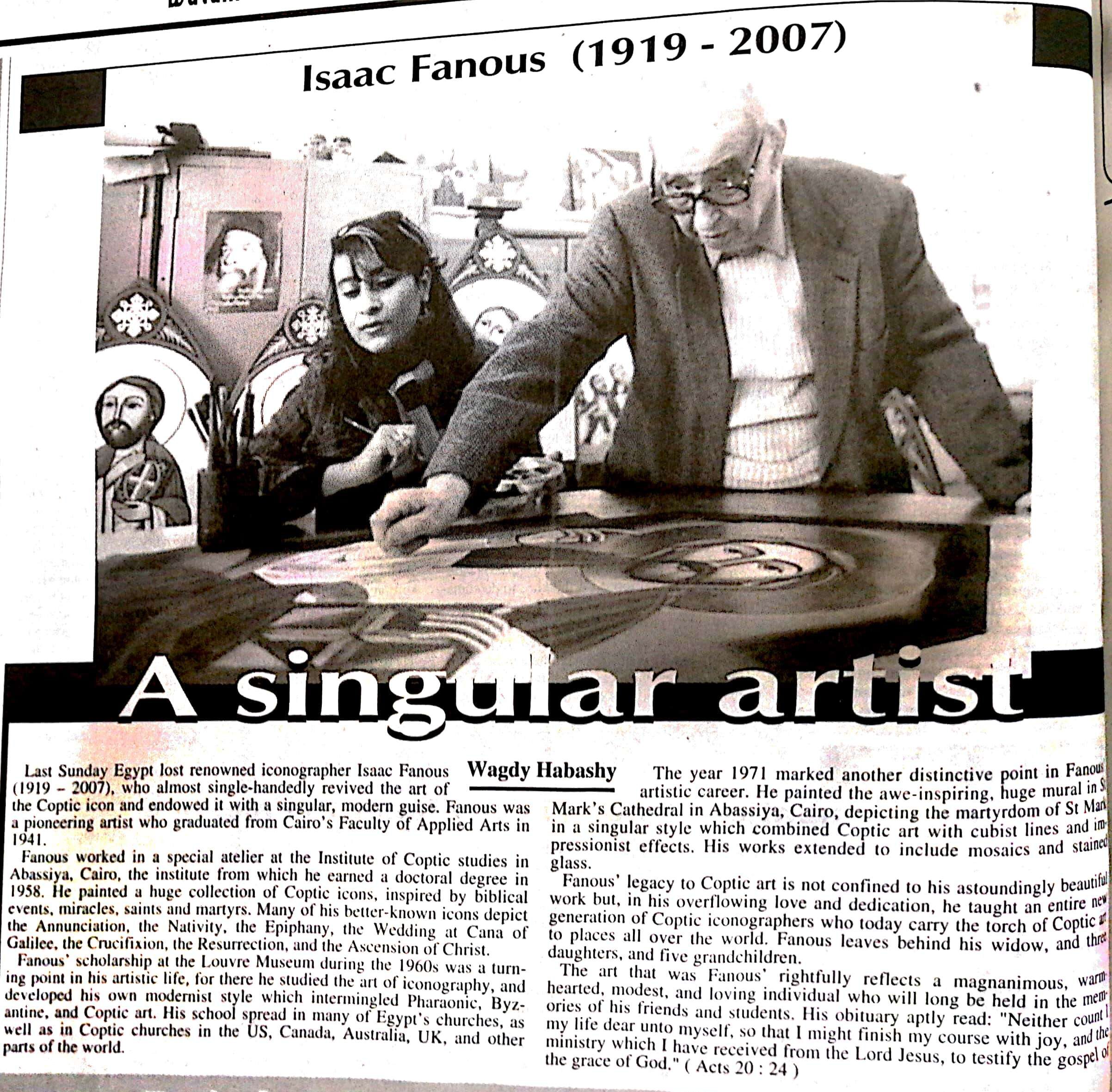
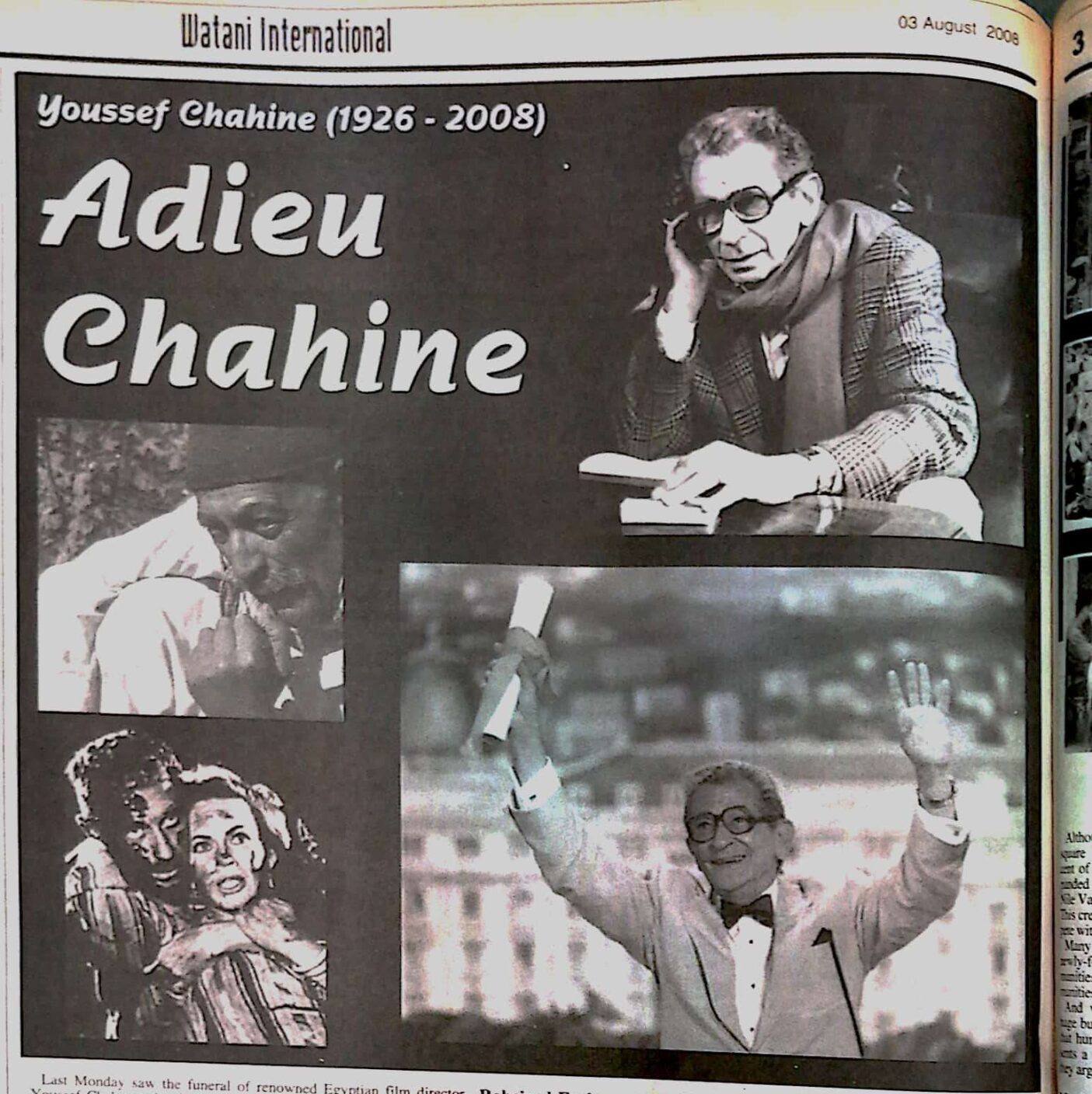
Note of joy
Among the interviews published in Watani International in 2008 was one with General Fouad Allam, former State Security Intelligence Chief, conducted by Robeir al-Faris and printed on 2 September 2007, in which a number of significant topics were candidly broached, not least being the Coptic question.
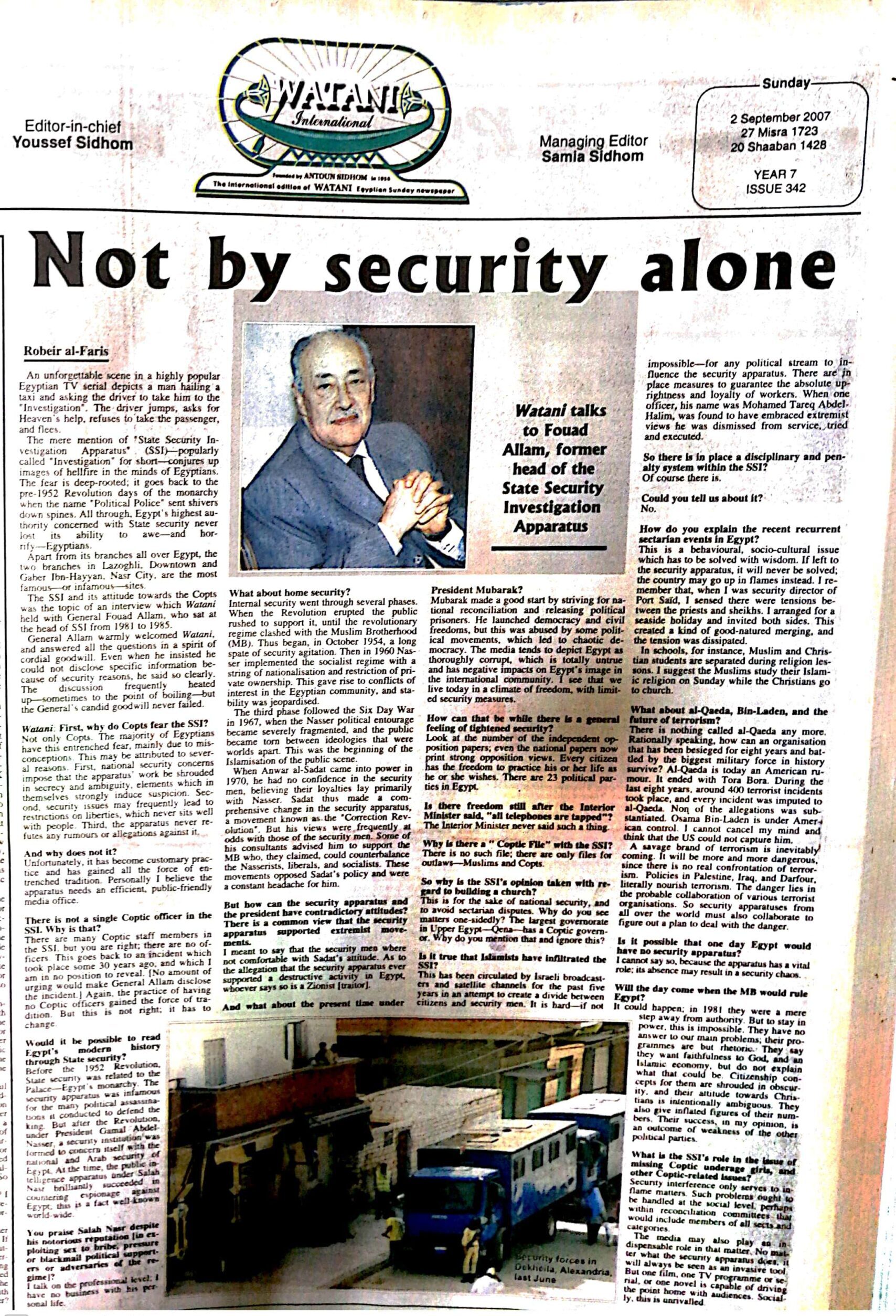
Another outstanding interview printed on 2 December 2007 was with Pope Shenouda who talked to Watani’s Nevine Kameel on the attacks against Copts; the too-few Copts in senior posts in government and State institutions; the seeming refrainment of Copts from participation in politics; religious conversion; demands for a law for building churches; and relations between the Coptic Church and other Churches in the world.
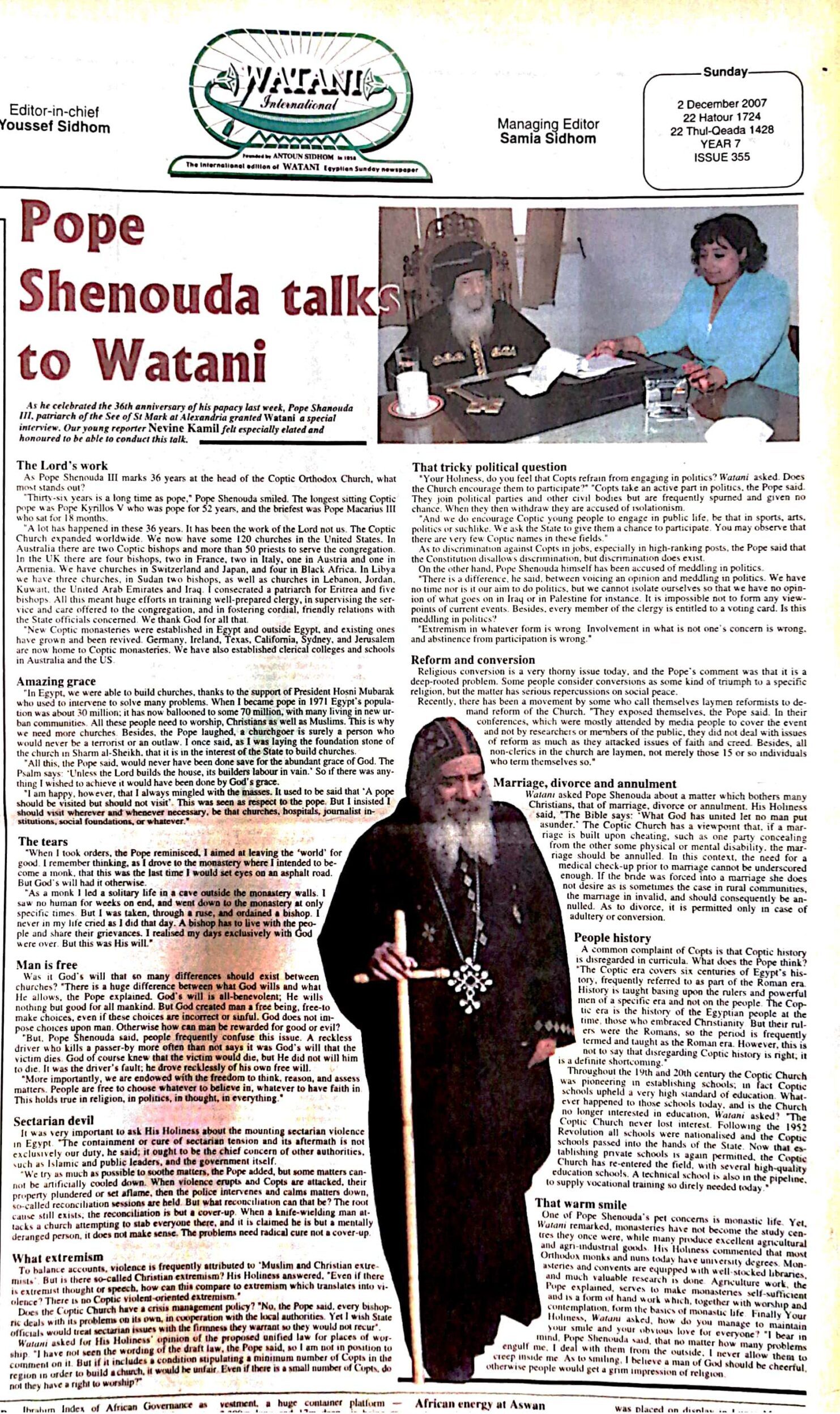
The year 2008 ended on a joyful note with Watani celebrating its golden jubilee on 24 December. A great event was held on 24 November at the Cairo Sonesta Hotel to mark the occasion; Watani International printed coverage on 30 November and 21 December. Pope Shenouda graciously accepted Watani’s invitation and was there as guest of honour. Samira Sidhom (1925 – 2019), widow of Watani’s founder Antoun Sidhom (1915 – 1995) attended, as did a number of figures who had over the years been friends of Watani, in addition to Watani staff.
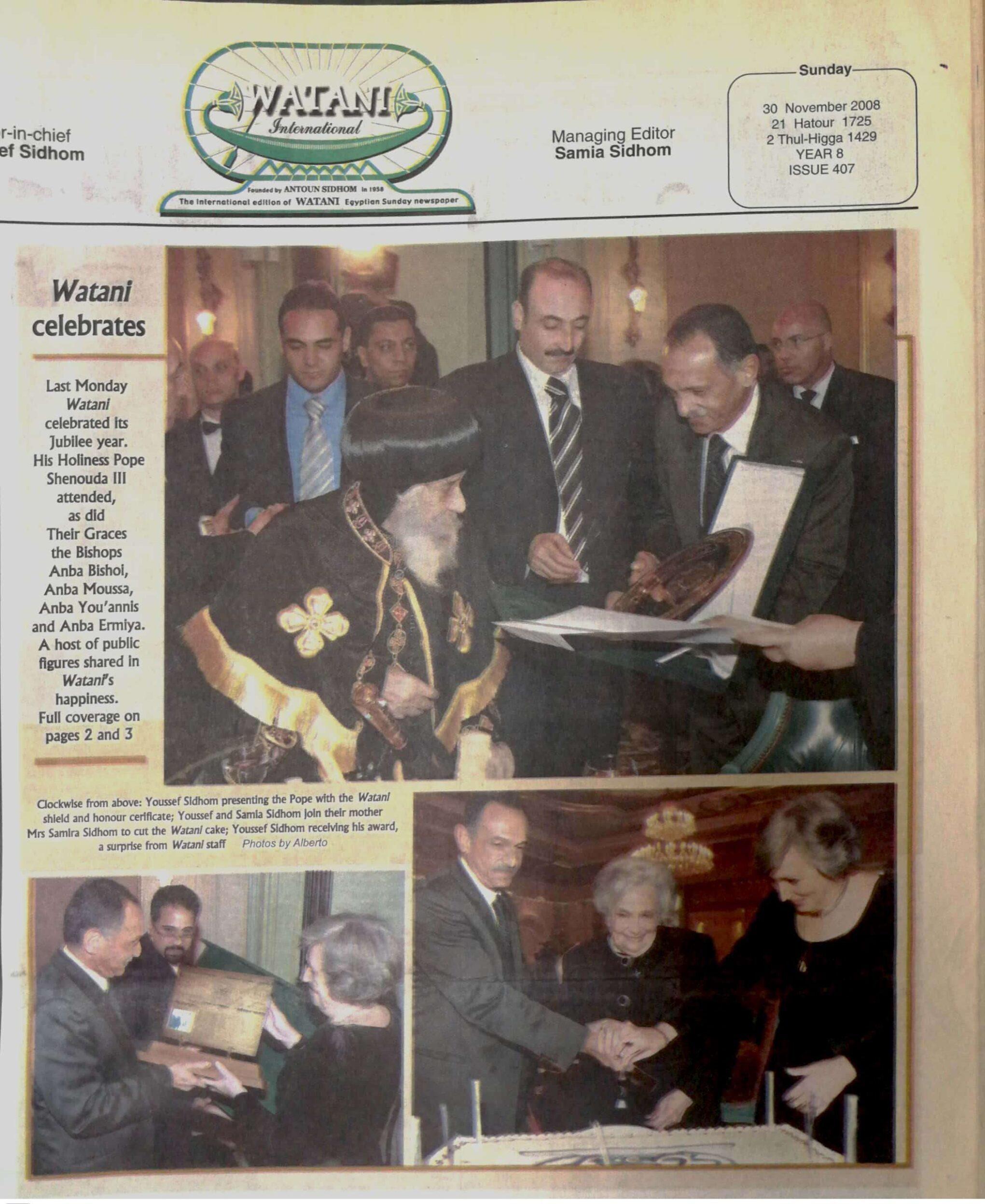
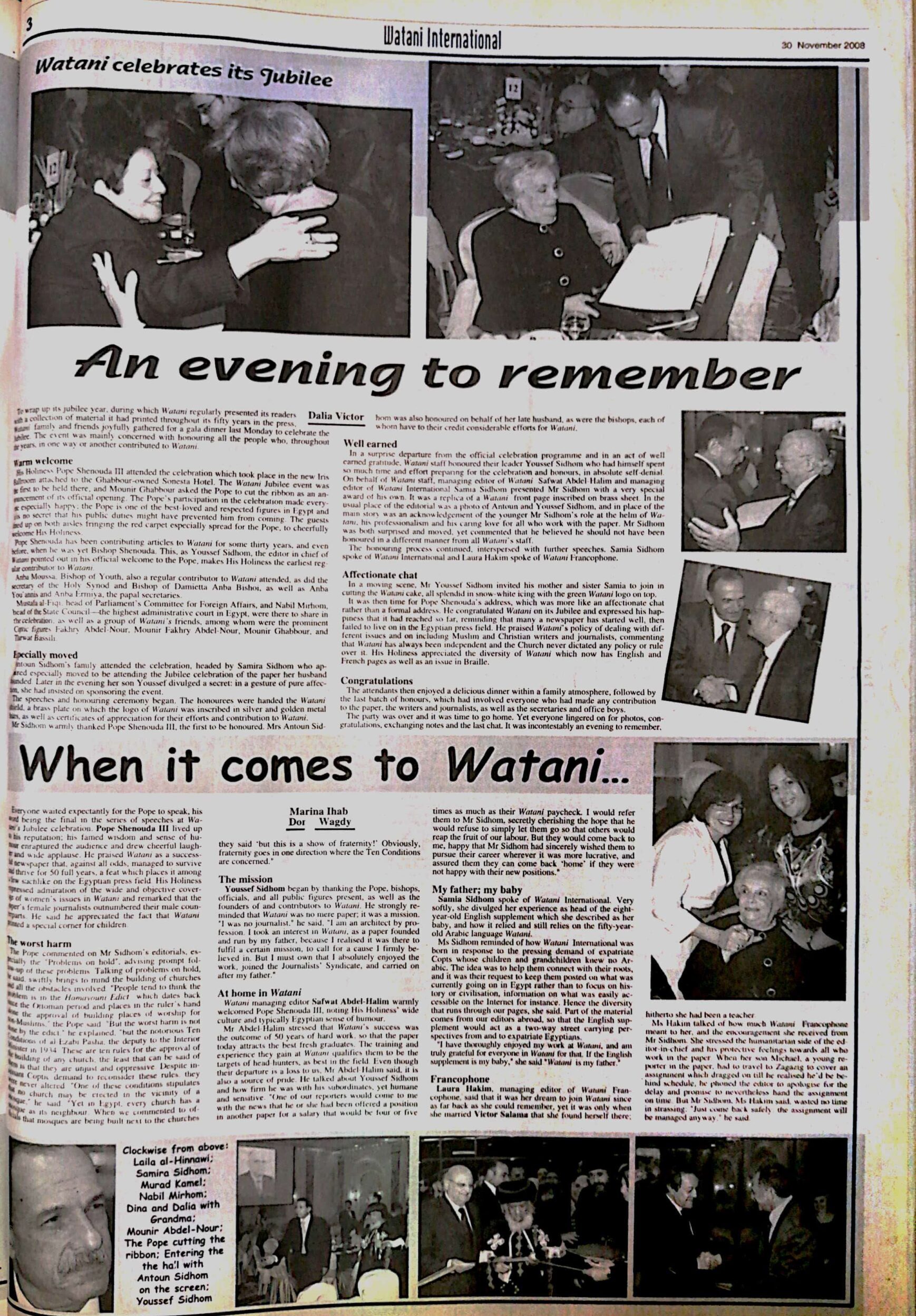
Words warmly focused the paper’s mission, Watani commemorative shields were handed, the Pope spoke of the paper and the people that bring it out in his landmark wisdom, warmth, and humour. He said it was an outstanding feat for the paper to thrive a full 50 years against all odds, praised its objective reporting on varied topics, and commended the fact that the number of female reporters appeared to exceed that of the males. Finally, he was joined by Mrs Sidhom, Youssef and Samia Sidhom in cutting the cake, and taking souvenir photographs with those present. It was an evening which defied the grievances surrounding us, and which to this day fills our hearts with joy and peace.
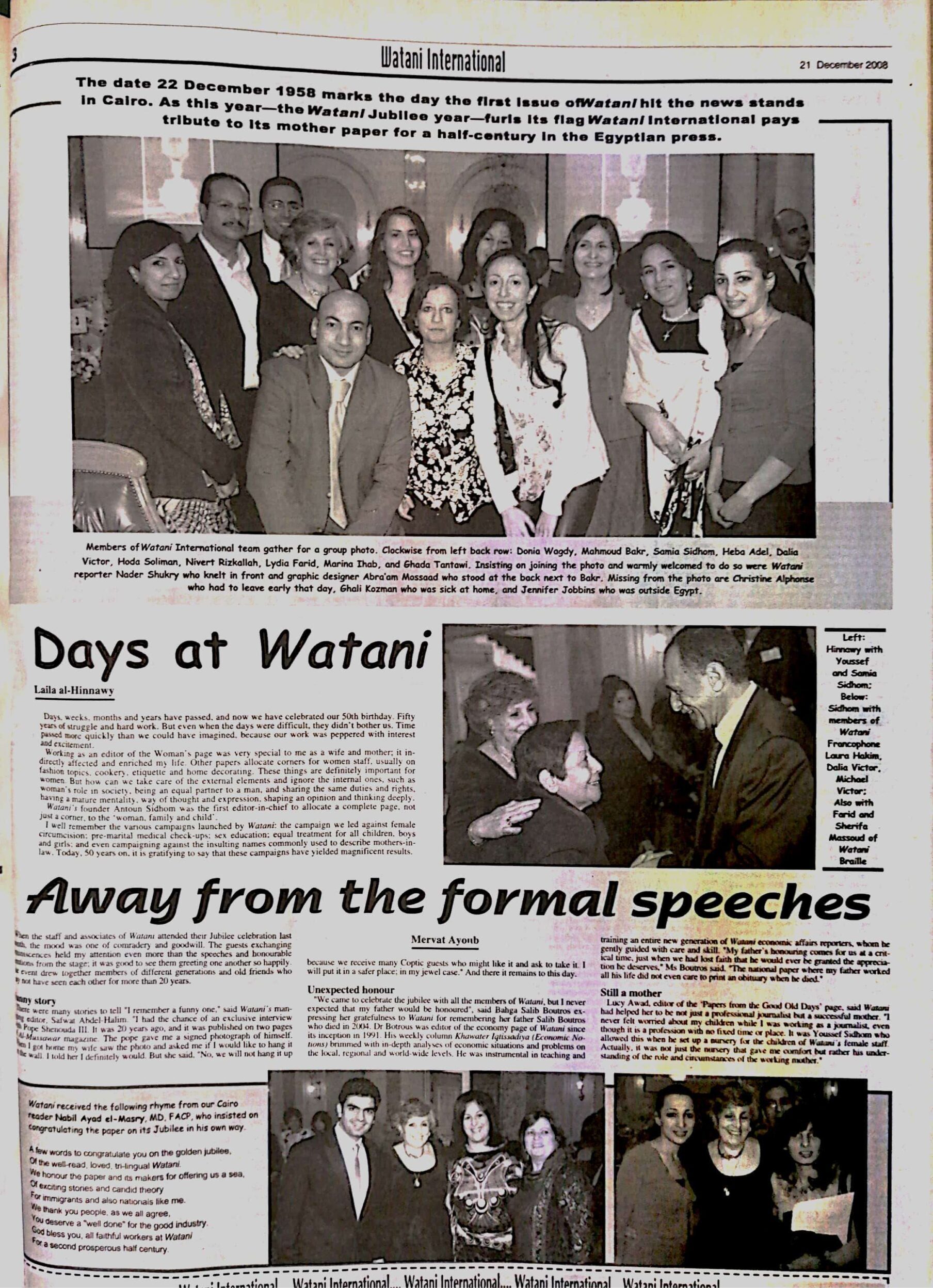
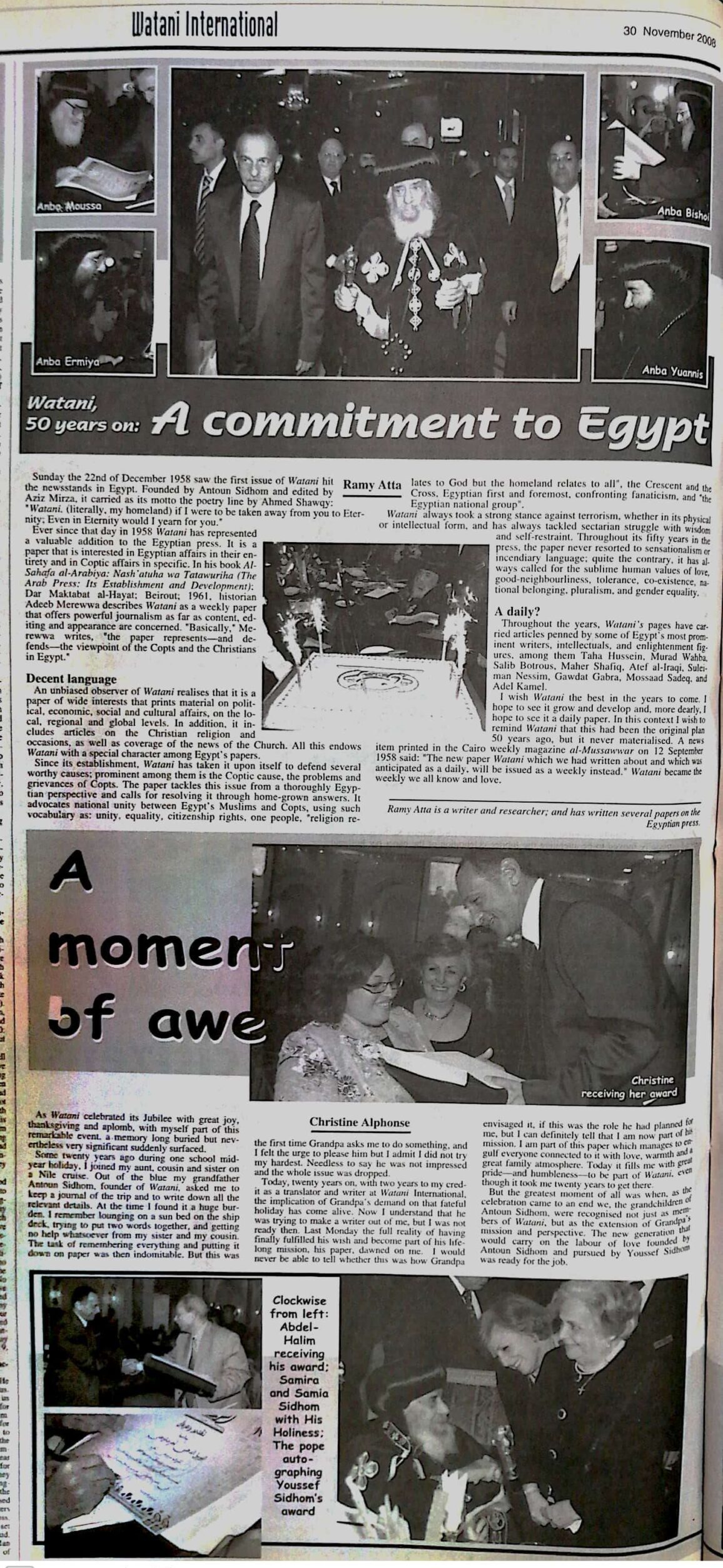
Watani International
24 June 2021













